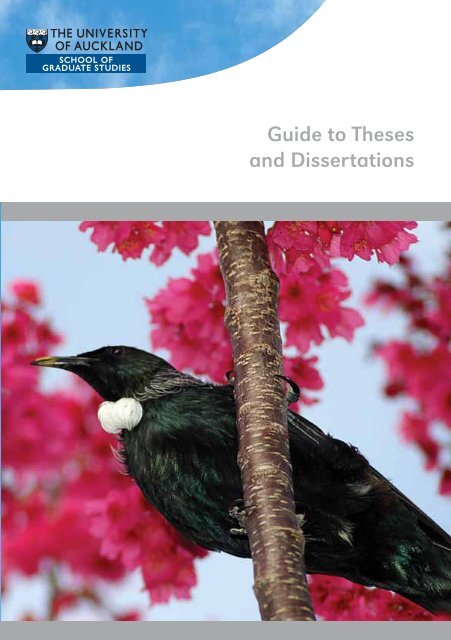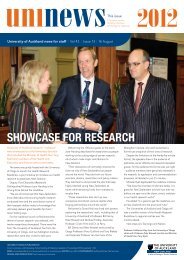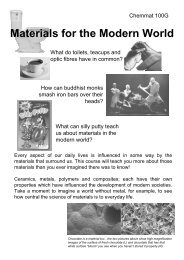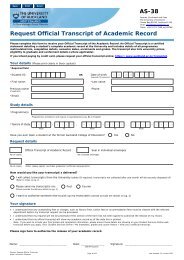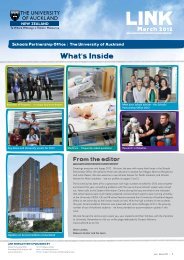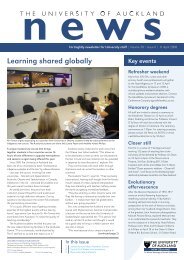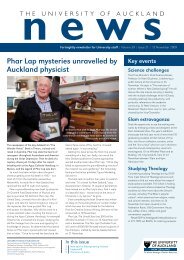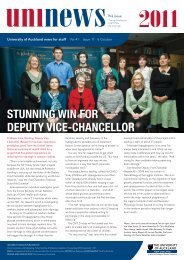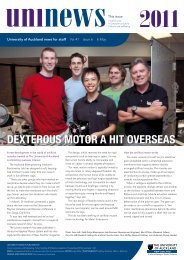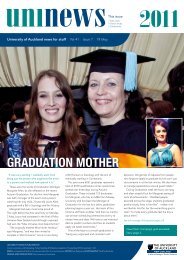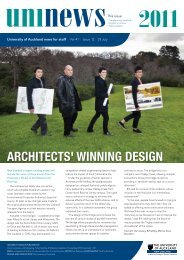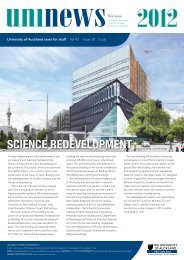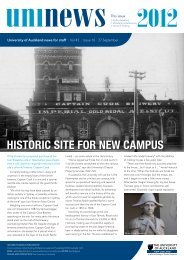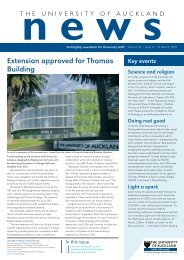Guide to Theses and Dissertations - The University of Auckland
Guide to Theses and Dissertations - The University of Auckland
Guide to Theses and Dissertations - The University of Auckland
Create successful ePaper yourself
Turn your PDF publications into a flip-book with our unique Google optimized e-Paper software.
<strong>Guide</strong> <strong>to</strong> <strong><strong>The</strong>ses</strong><br />
<strong>and</strong> <strong>Dissertations</strong>
<strong>Guide</strong> <strong>to</strong> <strong><strong>The</strong>ses</strong><br />
<strong>and</strong> <strong>Dissertations</strong><br />
This document is a general guide <strong>to</strong> the<br />
presentation <strong>and</strong> submission <strong>of</strong> theses<br />
<strong>and</strong> dissertations <strong>and</strong> contains additional<br />
information about related policies <strong>and</strong><br />
procedures. It should be read alongside<br />
the relevant regulations the thesis or<br />
dissertation c<strong>and</strong>idate is registered under<br />
<strong>and</strong> <strong>The</strong> <strong>University</strong> <strong>of</strong> Auckl<strong>and</strong> Calendar.<br />
<strong>The</strong> online version <strong>of</strong> the Calendar<br />
(www.calendar.auckl<strong>and</strong>.ac.nz) remains<br />
the definitive source <strong>of</strong> information. In the<br />
event <strong>of</strong> any conflict between the relevant<br />
regulations <strong>and</strong> this guide, the regulations<br />
outlined in the online version <strong>of</strong> the<br />
Calendar will prevail.<br />
Enquiries:<br />
School <strong>of</strong> Graduate Studies<br />
ClockTower — East Wing<br />
22 Princes Street, Auckl<strong>and</strong><br />
Phone: +64 9 373 7599 ext 81321<br />
Fax: +64 9 373 7610 / ext 84310 (internal)<br />
Email: postgraduate@auckl<strong>and</strong>.ac.nz<br />
Website: www.postgrad.auckl<strong>and</strong>.ac.nz<br />
<strong>Guide</strong> <strong>to</strong> <strong><strong>The</strong>ses</strong> <strong>and</strong> <strong>Dissertations</strong> | 1
2<br />
Contents<br />
1 Introduction ....................................................................................................................................4<br />
2 Where can I get help? ....................................................................................................................5<br />
2.1 Your Supervisor ............................................................................................................................................... 5<br />
2.2 Departmental Graduate Adviser ................................................................................................................ 5<br />
2.3 School <strong>of</strong> Graduate Studies .......................................................................................................................... 5<br />
2.4 <strong>The</strong> <strong>University</strong> Library ................................................................................................................................... 5<br />
2.5 ResearchSpace ................................................................................................................................................ 5<br />
2.6 <strong>The</strong> Centre for Academic Development - Tā te Ākonga (Student Learning) ....................................... 6<br />
2.7 Computing Services ....................................................................................................................................... 6<br />
3 Integrity in Research ......................................................................................................................7<br />
3.1 Applying for Ethics Approvals ...................................................................................................................... 7<br />
3.2 Avoiding Plagiarism ....................................................................................................................................... 7<br />
3.3 Turnitin .............................................................................................................................................................. 7<br />
3.4 Using copyright material other than your own ........................................................................................ 8<br />
a Copyright has expired ............................................................................................................................. 9<br />
b Copying under licence ...........................................................................................................................10<br />
c Fair dealing for criticism <strong>and</strong> review ..................................................................................................10<br />
d No copyright ........................................................................................................................................... 11<br />
e Copying permitted ................................................................................................................................. 11<br />
3.5 Collaboration ................................................................................................................................................ 11<br />
3.6 Commissioning ............................................................................................................................................. 12<br />
3.7 Joint ownership ............................................................................................................................................. 12<br />
3.8 Obtaining permission .................................................................................................................................. 13<br />
3.9 Third party editing ....................................................................................................................................... 15<br />
4 Style <strong>and</strong> Format ..........................................................................................................................16<br />
4.1 Backing up your work .................................................................................................................................. 16<br />
4.2 Pro<strong>of</strong>reading .................................................................................................................................................. 16<br />
4.3 Language ....................................................................................................................................................... 16<br />
4.4 Word length ................................................................................................................................................... 16<br />
4.5 Page size......................................................................................................................................................... 17<br />
4.6 Margins .......................................................................................................................................................... 17<br />
4.7 Typeface ......................................................................................................................................................... 17<br />
4.8 Paragraphing <strong>and</strong> line spacing .................................................................................................................. 17<br />
4.9 Quotations ..................................................................................................................................................... 18<br />
4.10 Footnotes ........................................................................................................................................................ 18<br />
4.11 Page order <strong>and</strong> pagination......................................................................................................................... 18<br />
4.12 Elements <strong>of</strong> a thesis or dissertation .......................................................................................................... 19<br />
a Library <strong>The</strong>sis Consent Form ...............................................................................................................22<br />
b Title page .................................................................................................................................................22<br />
c Abstract ....................................................................................................................................................22<br />
d Dedication ...............................................................................................................................................22<br />
e Preface <strong>and</strong>/or acknowledgments ......................................................................................................22<br />
f Table <strong>of</strong> contents ....................................................................................................................................22<br />
g Lists <strong>of</strong> tables, figures, etc ....................................................................................................................23<br />
| <strong>Guide</strong> <strong>to</strong> <strong><strong>The</strong>ses</strong> <strong>and</strong> <strong>Dissertations</strong>
h Glossary ...................................................................................................................................................23<br />
i Co-Authorship/Co-Production Forms ..................................................................................................23<br />
j Main text <strong>of</strong> thesis or dissertation ......................................................................................................23<br />
k Appendices .............................................................................................................................................. 24<br />
l Bibliography/list <strong>of</strong> references ............................................................................................................. 24<br />
5 Binding ..........................................................................................................................................25<br />
5.1 Paper ...............................................................................................................................................................25<br />
5.2 Images ............................................................................................................................................................25<br />
5.3 Folded Maps or Charts ...............................................................................................................................25<br />
5.4 Additional Material ......................................................................................................................................25<br />
5.5 General Binding Requirements ..................................................................................................................25<br />
5.6 Binding a Masters <strong>The</strong>sis ............................................................................................................................26<br />
5.7 Binding a Doc<strong>to</strong>ral <strong>The</strong>sis ...........................................................................................................................26<br />
a Initial submission ....................................................................................................................................26<br />
b Final submission .....................................................................................................................................26<br />
5.8 Binding <strong>Dissertations</strong>, Research Portfolios, etc ...................................................................................... 27<br />
6 Digital copies <strong>and</strong> ResearchSpace .............................................................................................28<br />
7 Submission ....................................................................................................................................29<br />
7.1 Masters <strong>The</strong>sis or Research Portfolio .......................................................................................................29<br />
a Deadlines for submission <strong>of</strong> a masters thesis or research portfolio ............................................29<br />
b Submitting a masters thesis .................................................................................................................29<br />
c Submitting a research portfolio or dissertation ...............................................................................29<br />
7.2 Doc<strong>to</strong>r <strong>of</strong> Philosophy <strong>and</strong> Doc<strong>to</strong>r <strong>of</strong> Education ......................................................................................29<br />
a Make an appointment...........................................................................................................................30<br />
b Copies for examination .........................................................................................................................30<br />
c Statu<strong>to</strong>ry declaration as <strong>to</strong> originality ...............................................................................................30<br />
d Hardbound copies..................................................................................................................................30<br />
e Deposit <strong>of</strong> digital copy .......................................................................................................................... 31<br />
7.3 Doc<strong>to</strong>r <strong>of</strong> Clinical Psychology ..................................................................................................................... 31<br />
7.4 Doc<strong>to</strong>r <strong>of</strong> Fine Arts, Doc<strong>to</strong>r <strong>of</strong> Music <strong>and</strong> Doc<strong>to</strong>r <strong>of</strong> Musical Arts ..................................................... 31<br />
7.5 Doc<strong>to</strong>r <strong>of</strong> Medicine ...................................................................................................................................... 31<br />
7.6 Higher Degrees ............................................................................................................................................32<br />
8 Library Matters .............................................................................................................................33<br />
8.1 Deposit <strong>of</strong> <strong><strong>The</strong>ses</strong> in the Library ................................................................................................................33<br />
8.2 Author’s Rights .............................................................................................................................................33<br />
a Reproduction ...........................................................................................................................................33<br />
b Copyright .................................................................................................................................................33<br />
c Restrictions on access (embargoes) ....................................................................................................33<br />
8.3 Failed Works ..................................................................................................................................................33<br />
9 Selected Bibliography ..................................................................................................................34<br />
10 Useful Websites ............................................................................................................................35<br />
<strong>The</strong>sis Submission Checklist for Students ........................................................................................36<br />
Checklist for Supervisors/Heads <strong>of</strong> Department ............................................................................37<br />
<strong>Guide</strong> <strong>to</strong> <strong><strong>The</strong>ses</strong> <strong>and</strong> <strong>Dissertations</strong> | 3
4<br />
1 Introduction<br />
A thesis or dissertation is the written report <strong>of</strong> a research study undertaken in fulfilment<br />
or partial fulfilment <strong>of</strong> a graduate degree such as a doc<strong>to</strong>rate, masters degree, bachelors<br />
(honours) degree, or a postgraduate diploma. It is an undertaking that allows you <strong>to</strong><br />
explore areas or problems in detail, <strong>and</strong> develop <strong>and</strong> utilise your thinking <strong>and</strong> analytical<br />
skills. Your thesis or dissertation should demonstrate a capacity for independent thinking,<br />
contribute <strong>to</strong> existing scholarship <strong>and</strong> must meet international st<strong>and</strong>ards for such<br />
scholarly research.<br />
Before embarking on your research, you should consult the current <strong>University</strong> <strong>of</strong> Auckl<strong>and</strong><br />
Calendar regulations applicable for your degree, the Academic Statutes <strong>and</strong> Regulations<br />
(which include the General Regulations — Masters Degrees, the General Regulations for<br />
Named Doc<strong>to</strong>rates, <strong>and</strong> the Examination Regulations, as well as the Doc<strong>to</strong>r <strong>of</strong> Philosophy<br />
<strong>and</strong> Higher Degrees regulations). <strong>The</strong>se are available on <strong>The</strong> <strong>University</strong> <strong>of</strong> Auckl<strong>and</strong><br />
website www.calendar.auckl<strong>and</strong>.ac.nz.<br />
Masters students should refer <strong>to</strong> the following publication:<br />
• Masters H<strong>and</strong>book<br />
Doc<strong>to</strong>ral students should refer <strong>to</strong> the following publications:<br />
• Statute <strong>and</strong> <strong>Guide</strong>lines for the Degree <strong>of</strong> Doc<strong>to</strong>r <strong>of</strong> Philosophy (PhD)<br />
• Doc<strong>to</strong>ral H<strong>and</strong>book<br />
<strong>The</strong>se may all be found at<br />
www.auckl<strong>and</strong>.ac.nz/uoa/home/for/current-students/cs-current-pg/cs-current-pg-policies.<br />
All <strong>of</strong> these publications are also available in hard copy from the Graduate Centre. If you<br />
are undertaking a named doc<strong>to</strong>rate, please refer <strong>to</strong> <strong>The</strong> <strong>University</strong> <strong>of</strong> Auckl<strong>and</strong> Calendar<br />
(www.calendar.auckl<strong>and</strong>.ac.nz).<br />
All research students should consult the Student Charter:<br />
(www.auckl<strong>and</strong>.ac.nz/uoa/home/for/current-students/cs-academic-information/csregulations-policies-<strong>and</strong>-guidelines/cs-student-charter).<br />
This document represents a philosophical underst<strong>and</strong>ing between the <strong>University</strong> <strong>and</strong> its<br />
students, <strong>and</strong> is aimed at preventing problems before they occur. It provides information<br />
about student rights <strong>and</strong> responsibilities, <strong>and</strong> clarifies the responsibilities <strong>of</strong> the<br />
<strong>University</strong>.<br />
| <strong>Guide</strong> <strong>to</strong> <strong><strong>The</strong>ses</strong> <strong>and</strong> <strong>Dissertations</strong>
2 Where can I get help?<br />
If you require assistance with the presentation <strong>and</strong> submission <strong>of</strong> your thesis or<br />
dissertation, your supervisors <strong>and</strong> department/faculty are your principal sources <strong>of</strong><br />
support. However, several other service divisions at the <strong>University</strong> are also able <strong>to</strong> assist<br />
you. Sources <strong>of</strong> support are outlined below.<br />
2.1 Your Supervisor<br />
<strong>The</strong> responsibility for the submission <strong>of</strong> your thesis is yours (Senate <strong>Guide</strong>lines on <strong>The</strong>sis Supervision —<br />
www.auckl<strong>and</strong>.ac.nz/uoa/cs-pg-doc-theses-dissertations); however, the decision as <strong>to</strong> when it is ready is<br />
crucial, <strong>and</strong> you should seek <strong>and</strong> heed guidance from your supervisor. <strong>The</strong> final stage <strong>of</strong> the thesis is<br />
dem<strong>and</strong>ing <strong>and</strong> you are likely <strong>to</strong> need supervisory support <strong>and</strong> expertise as you prepare <strong>to</strong> submit.<br />
2.2 Departmental Graduate Adviser<br />
<strong>The</strong> Departmental Graduate Adviser is another expert who may be able <strong>to</strong> give you advice about<br />
departmental or disciplinary requirements for the presentation <strong>of</strong> your thesis or dissertation. Should any<br />
difficulties arise at the completion phase that you cannot resolve with your supervisor, the Departmental<br />
Graduate Adviser is able <strong>to</strong> give advice <strong>and</strong> direction.<br />
2.3 School <strong>of</strong> Graduate Studies<br />
<strong>The</strong> School <strong>of</strong> Graduate Studies <strong>and</strong> postgraduate student advisers are located at the Graduate Centre.<br />
Staff can advise you on regulations, doc<strong>to</strong>ral/masters administration, examination processes, thesis<br />
submission, dispute <strong>and</strong> appeals procedures, <strong>and</strong> the role <strong>of</strong> the Board <strong>of</strong> Graduate Studies.<br />
<strong>The</strong> Graduate Centre is located in the East Wing <strong>of</strong> the ClockTower, 22 Princes St, City Campus <strong>and</strong> is<br />
open from 8.30am <strong>to</strong> 5pm each weekday. Telephone 373 7599 ext 81321, email postgraduate@<br />
auckl<strong>and</strong>.ac.nz, or alternatively visit the website (www.postgrad.auckl<strong>and</strong>.ac.nz).<br />
2.4 <strong>The</strong> <strong>University</strong> Library<br />
<strong>The</strong> <strong>University</strong> <strong>of</strong> Auckl<strong>and</strong> Library provides advice on how <strong>to</strong> find theses (both those from <strong>The</strong> <strong>University</strong><br />
<strong>of</strong> Auckl<strong>and</strong> <strong>and</strong> other universities), as well as general information on where <strong>to</strong> get assistance in writing<br />
<strong>and</strong> submitting your thesis. A summary <strong>of</strong> this information can be found on the Library webpage, under<br />
the <strong><strong>The</strong>ses</strong> <strong>and</strong> <strong>Dissertations</strong> link at http://www.library.auckl<strong>and</strong>.ac.nz/thesis/. More information about<br />
library services for postgraduate students can be found in both the Doc<strong>to</strong>ral H<strong>and</strong>book <strong>and</strong> the Masters<br />
H<strong>and</strong>book (www.auckl<strong>and</strong>.ac.nz/uoa/home/for/current-students/cs-current-pg/cs-pg-publications).<br />
<strong><strong>The</strong>ses</strong> must be deposited in the Library on successful completion <strong>of</strong> your examination (see section 8).<br />
2.5 ResearchSpace<br />
ResearchSpace is a digital reposi<strong>to</strong>ry or archive for <strong>University</strong> <strong>of</strong> Auckl<strong>and</strong> digital theses <strong>and</strong> research<br />
materials. <strong>The</strong>re are special deposit forms for PhD <strong>and</strong> for masters theses. <strong>The</strong>se are available at<br />
https://deposit.library.auckl<strong>and</strong>.ac.nz/.<br />
<strong>Guide</strong> <strong>to</strong> <strong><strong>The</strong>ses</strong> <strong>and</strong> <strong>Dissertations</strong> | 5
6<br />
2.6 <strong>The</strong> Centre for Academic Development — Tā te Ākonga<br />
(Student Learning)<br />
CAD’s student learning group supports the pr<strong>of</strong>essional <strong>and</strong> academic development <strong>of</strong> students with a<br />
comprehensive range <strong>of</strong> support services <strong>to</strong> postgraduate <strong>and</strong> doc<strong>to</strong>ral students including courses,<br />
workshops, individual consultations, <strong>and</strong> online assistance. <strong>The</strong> student learning group provides courses<br />
<strong>and</strong> workshops throughout the year on most aspects <strong>of</strong> the thesis <strong>and</strong> dissertation writing process,<br />
including research <strong>and</strong> data analysis, showing critical analysis in the literature review, self-management,<br />
computing, <strong>and</strong> presenting at conferences. It provides support for students whose first language is not<br />
English with academic writing.<br />
Details <strong>of</strong> postgraduate courses can be found at www.cad.auckl<strong>and</strong>.ac.nz/index.php?p=slc or by phoning<br />
373 7599 ext 88850. Individual consultations can also be booked by phoning ext 88850.<br />
Courses specifically for doc<strong>to</strong>ral students can be found on the DSP website at<br />
www.auckl<strong>and</strong>.ac.nz/uoa/home/for/current-students/cs-current-pg/cs-dsp. <strong>The</strong> DSP provides a course on<br />
finishing <strong>and</strong> submitting <strong>and</strong> another on the oral examination.<br />
2.7 Computing Services<br />
IT literacy is an essential aspect <strong>of</strong> writing a thesis. <strong>The</strong> <strong>University</strong> <strong>of</strong> Auckl<strong>and</strong> provides a range <strong>of</strong> IT<br />
services <strong>to</strong> assist you with your course <strong>of</strong> study. Consult Student IT Essentials on the <strong>University</strong> website for<br />
further information (http://www.auckl<strong>and</strong>.ac.nz/uoa/home/for/current-students/cs-student-it-essentials).<br />
Otherwise, you may obtain assistance from the computer support person for your department or<br />
telephone the Information Commons Helpdesk on 373 7599 ext 82300/82333,<br />
email ichelpdesk@auckl<strong>and</strong>.ac.nz.<br />
| <strong>Guide</strong> <strong>to</strong> <strong><strong>The</strong>ses</strong> <strong>and</strong> <strong>Dissertations</strong>
3 Integrity in Research<br />
3.1 Applying for Ethics Approvals<br />
<strong>Guide</strong>lines can be downloaded from the <strong>University</strong> website (http://www.auckl<strong>and</strong>.ac.nz/uoa/re-ethics). If<br />
your thesis research involves human participants or animals in any way, you must obtain ethics approval<br />
from <strong>The</strong> <strong>University</strong> <strong>of</strong> Auckl<strong>and</strong> Human Participants Committee, the relevant New Zeal<strong>and</strong> Health <strong>and</strong><br />
Disability Ethics Committee, or the Animal Ethics Committees. Discuss with your supervisor the<br />
appropriate way <strong>to</strong> document your ethics approval within your thesis.<br />
3.2 Avoiding Plagiarism<br />
In any thesis, dissertation, report or project, unacknowledged copying or plagiarism is not acceptable<br />
<strong>and</strong> is treated as an examination <strong>of</strong>fence. In the <strong>University</strong> document <strong>Guide</strong>lines: Conduct <strong>of</strong><br />
Coursework (https://policies.auckl<strong>and</strong>.ac.nz/policies/Policies/policy-display-register/guidelines-for-theconduct-<strong>of</strong>-coursework.pdf)<br />
plagiarism is defined as follows:<br />
Plagiarism means using the work <strong>of</strong> others in preparing an assignment <strong>and</strong> presenting it as<br />
your own without explicitly acknowledging — or referencing — where it came from. Plagiarism<br />
can also mean not acknowledging the full extent <strong>of</strong> indebtedness <strong>to</strong> a source. Work can be<br />
plagiarised from many sources including books, articles, the internet, <strong>and</strong> other students’<br />
assignments. Plagiarism can also occur unconsciously or inadvertently. Direct copying is<br />
definitely plagiarism. Paraphrasing <strong>of</strong> another work without attribution is also plagiarism.<br />
Submitting someone else’s work or ideas without acknowledgement or attribution is not<br />
evidence <strong>of</strong> your own grasp <strong>of</strong> the material <strong>and</strong> cannot earn you marks.<br />
Further information can be found at: www.auckl<strong>and</strong>.ac.nz/uoa/home/about/teaching-learning/honesty.<br />
In addition, the Doc<strong>to</strong>ral Skills Programme <strong>of</strong>fers a session on Citing <strong>and</strong> Avoiding Plagiarism<br />
(www.library.auckl<strong>and</strong>.ac.nz/booking/doc<strong>to</strong>ral/index.asp). Students may also wish <strong>to</strong> submit a final<br />
draft <strong>of</strong> their thesis through Turnitin (see next section for further information).<br />
3.3 Turnitin<br />
Turnitin is a web-based originality checking service that is used by many universities worldwide. When<br />
a student’s work is submitted <strong>to</strong> Turnitin it is matched against millions <strong>of</strong> internet pages, electronic<br />
journals, books, <strong>and</strong> a database <strong>of</strong> all previously <strong>and</strong> concurrently submitted assignments. Turnitin then<br />
generates an originality report providing a summary <strong>of</strong> matching or similar text found in the submitted<br />
paper. Turnitin can be used <strong>to</strong> check sources have been correctly acknowledged <strong>and</strong> cited. <strong>The</strong> student<br />
should ensure that, irrespective <strong>of</strong> the results <strong>of</strong> the Turnitin originality report, all copyright requirements<br />
as well as the <strong>University</strong>’s st<strong>and</strong>ard on avoiding plagiarism are met.<br />
Masters <strong>and</strong> doc<strong>to</strong>ral students who wish <strong>to</strong> submit a draft <strong>of</strong> their theses through Turnitin can either<br />
arrange this through their supervisor, or contact the Graduate Centre (postgraduate@auckl<strong>and</strong>.ac.nz).<br />
Students who use Turnitin through the Graduate Centre will be sent the required course code <strong>and</strong><br />
password <strong>and</strong> will have full access <strong>to</strong> the originality report for their work. <strong>The</strong> originality report will not<br />
be made available <strong>to</strong> anyone else <strong>and</strong> will not be used for any other purpose. Students may wish <strong>to</strong><br />
discuss the originality report with their supervisor, or refer <strong>to</strong> the Turnitin website for information on<br />
underst<strong>and</strong>ing their originality report.<br />
<strong>Guide</strong> <strong>to</strong> <strong><strong>The</strong>ses</strong> <strong>and</strong> <strong>Dissertations</strong> | 7
8<br />
Additional information on Turnitin is available from:<br />
<strong>University</strong> <strong>of</strong> Auckl<strong>and</strong> » Teaching <strong>and</strong> learning » Academic honesty <strong>and</strong> plagiarism » Turnitin for<br />
students. http://www.auckl<strong>and</strong>.ac.nz/uoa/home/about/teaching-learning/honesty/tl-turnitin-for-students<br />
Turnitin website http://www.turnitin.com » click on Training or Support<br />
3.4 Using copyright material other than your own<br />
While you are permitted under the Copyright Act 1994 <strong>to</strong> copy another person’s copyright work (third<br />
party copyright) <strong>and</strong> include this copy in a live, printed or digital format with your thesis for the purposes<br />
<strong>of</strong> examination, this exception does not apply if you “publish” or “communicate” your thesis <strong>to</strong> the public<br />
by way <strong>of</strong> the internet or live exhibition/performance.<br />
If your thesis is <strong>to</strong> be deposited as a digital copy in<strong>to</strong> ResearchSpace it becomes a “commercial<br />
publication” 1 under section 11 <strong>of</strong> the Copyright Act because it has been posted on the internet <strong>and</strong><br />
made “available <strong>to</strong> the public”.<br />
Prior written permission <strong>to</strong> allow your thesis <strong>to</strong> be made publicly available must be obtained from the<br />
copyright owners (this will include the publisher <strong>of</strong> your own work if you have assigned copyright <strong>to</strong> them<br />
or granted them an exclusive licence <strong>to</strong> publish) where:<br />
• a “whole work” is copied — a poem, diagram, chart, graphic or image is considered <strong>to</strong> be a “whole<br />
work” <strong>and</strong> is not just a part <strong>of</strong> the publication from which it has been taken; or<br />
• a substantial part <strong>of</strong> a work has been copied — a copy <strong>of</strong> a part <strong>of</strong> a work is considered substantial<br />
if it represents the essence or an important or significant part <strong>of</strong> that work; 2 or<br />
• you have collaborated with another person <strong>to</strong> create a copyright work which is jointly owned; or<br />
• where you have permission <strong>to</strong> use a work for one purpose (for example, a performance) <strong>and</strong> you now<br />
wish <strong>to</strong> include a recording <strong>of</strong> that work in your thesis i.e. the permission does not cover the use <strong>of</strong><br />
the work for another purpose.<br />
Note that works on the internet are likewise protected by copyright.<br />
You do not need the permission <strong>of</strong> the third party copyright owner if:<br />
1. copyright has expired — 50 years from the death <strong>of</strong> the author (section 22);<br />
2. the third party work copied or used is not protected by copyright — see the paragraph headed “No<br />
Copyright” below for further details;<br />
3. copying is permitted under the Act — e.g. abstracts <strong>of</strong> scientific <strong>and</strong> technical articles (section 71);<br />
buildings <strong>and</strong> sculptures on public display (section 73); literary or artistic works relating <strong>to</strong> medicines<br />
imported by the Crown (section 76);<br />
1 “Commercial publication” in relation <strong>to</strong> a literary, dramatic, musical or artistic work, means the publication <strong>of</strong> the work<br />
consisting <strong>of</strong>…(b) Making the work available <strong>to</strong> the public by means <strong>of</strong> an electronic retrieval system;…(section 11)<br />
2 A substantial part does not necessarily relate <strong>to</strong> the amount copied but rather the quality: Vanilla Ice sampled less than 3<br />
seconds <strong>of</strong> the most identifiable riffs from David Bowie <strong>and</strong> Queen’s song Under Pressure without consent or licence which<br />
apparently resulted in an out <strong>of</strong> court financial settlement, see: http://www.benedict.com/Audio/Vanilla/Vanilla.aspx.<br />
| <strong>Guide</strong> <strong>to</strong> <strong><strong>The</strong>ses</strong> <strong>and</strong> <strong>Dissertations</strong>
4. use clearly falls under one <strong>of</strong> the fair dealing exceptions in the Act such as fair dealing for the<br />
purpose <strong>of</strong> criticism <strong>and</strong> review (s.42);<br />
5. the author has made the work available under a licence which permits the use you intend <strong>to</strong> make<br />
<strong>of</strong> the work.<br />
Before you rely on any <strong>of</strong> these exceptions <strong>to</strong> copy a work without permission <strong>of</strong> the copyright owner, you<br />
must read a fuller explanation <strong>of</strong> permitted uses <strong>of</strong> the above which is set out below.<br />
Note that where you are copying or using another person’s work you must fully attribute those copyright<br />
works or you will be in breach <strong>of</strong> the original author’s “moral rights” which are protected under the<br />
Copyright Act <strong>and</strong> the <strong>University</strong>’s policies on plagiarism.<br />
a Copyright has expired<br />
Material in which copyright has expired may be copied in full <strong>and</strong> dealt with freely by the public.<br />
Under current New Zeal<strong>and</strong> law, the duration <strong>of</strong> copyright varies depending on the type <strong>of</strong> work<br />
protected. Note that if you intend publishing articles or a book overseas based on your thesis you may<br />
need <strong>to</strong> get permission <strong>to</strong> use work which is in the public domain in New Zeal<strong>and</strong>, as in many other<br />
countries including Australia, the United States <strong>and</strong> Europe, copyright expires 70 years following the<br />
death <strong>of</strong> the author.<br />
<strong>The</strong> duration <strong>of</strong> the term <strong>of</strong> copyright is as follows:<br />
• Literary 3 , dramatic 4 , musical 5 or artistic works 6 remain copyright protected until the end <strong>of</strong> the<br />
period <strong>of</strong> 50 years from the end <strong>of</strong> the calendar year in which the author dies (section 22).<br />
• Sound recordings <strong>and</strong> films remain protected for 50 years from the end <strong>of</strong> the calendar year in<br />
which the film is made or made available <strong>to</strong> the public whichever is later (section 23).<br />
• Communication works 7 remain protected for 50 years from the end <strong>of</strong> the calendar year in which<br />
the work is first communicated <strong>to</strong> the public (section 24).<br />
• Typographical arrangement or copyright in the layout, typically a published book or journal, remains<br />
protected for 25 years from the end <strong>of</strong> the calendar year in which the work was first published. Thus,<br />
new copyright protection attaches <strong>to</strong> each new typographical arrangement <strong>of</strong> a work; so that<br />
material contained within a new typographical arrangement <strong>of</strong> a book is subject <strong>to</strong> the copyright<br />
protection the book enjoys. That work may not be copied or dealt with unless it is done so under a<br />
licence or with the express permission <strong>of</strong> the rights holder, normally the publisher (section 25).<br />
• Works <strong>of</strong> unknown authorship — if it is not possible <strong>to</strong> ascertain the identity <strong>of</strong> the author by<br />
3 “Literary work” means any work, other than a dramatic or musical work, that is written, spoken, or sung; <strong>and</strong> includes (a) a<br />
table or compilation; <strong>and</strong> (b) a computer programme.<br />
4 “Dramatic work” includes (a) a work <strong>of</strong> dance or mime; <strong>and</strong> (b) a scenario or script for a film.<br />
5 “Musical work” means a work consisting <strong>of</strong> music, exclusive <strong>of</strong> any words intended <strong>to</strong> be sung or spoken with the music or<br />
any actions intended <strong>to</strong> be performed with the music.<br />
6 “Artistic work” means (a) (i) graphic work, pho<strong>to</strong>graph, painting, sculpture, collage, or model, irrespective <strong>of</strong> artistic quality;<br />
or (ii) a work <strong>of</strong> architecture, being a building or model for a building; or (iii) a work <strong>of</strong> artistic craftsmanship…<br />
7 “Communication work” means a transmission <strong>of</strong> sounds, visual images, or other information, or a combination <strong>of</strong> any <strong>of</strong><br />
those, for reception by members <strong>of</strong> the public, <strong>and</strong> includes a broadcast or a cable programme.<br />
<strong>Guide</strong> <strong>to</strong> <strong><strong>The</strong>ses</strong> <strong>and</strong> <strong>Dissertations</strong> | 9
easonable enquiry <strong>and</strong> it is reasonable <strong>to</strong> assume that the author has been dead for 50 years <strong>and</strong><br />
copyright has expired, you may freely use the work.<br />
DigitalNZ has created an easy reference guide “Copyright terms <strong>and</strong> the public domain in New<br />
Zeal<strong>and</strong>” for anyone wanting <strong>to</strong> know what was out <strong>of</strong> copyright in New Zeal<strong>and</strong> as <strong>of</strong> 1 January 2011.<br />
<strong>The</strong> guide is available on the DigitalNZ website at:<br />
http://makeit.digitalnz.org/guidelines/enabling-use-reuse/public-domain-guide/<br />
b Copying under licence<br />
Works posted on the internet are protected by copyright. Unless the author has clearly stated that you<br />
are permitted <strong>to</strong> copy the work <strong>and</strong> post it on the internet then you may only copy that work <strong>to</strong> the<br />
extent permitted under the Copyright Act 1994.<br />
<strong>The</strong> author may also make a work available under a licence such as a Creative Commons licence.<br />
Creative Commons licences allow crea<strong>to</strong>rs (licensors) <strong>to</strong> retain copyright while allowing others <strong>to</strong> copy,<br />
distribute, <strong>and</strong> make some uses <strong>of</strong> their work providing they give the licensor credit for their work.<br />
Creative Commons <strong>of</strong>fers 6 main licence types. Providing the licence permits you <strong>to</strong> copy the original<br />
work <strong>and</strong> distribute it online you may include that work in your thesis. More information about creative<br />
commons licences can be found at: http://www.creativecommons.org.nz/licences_explained__1.<br />
c Fair dealing for criticism <strong>and</strong> review<br />
Fair dealing means a use which is reasonable. <strong>The</strong>re is no clear formula for the amount which can be<br />
copied for the purpose <strong>of</strong> criticism <strong>and</strong> review. This will depend on the particular circumstances <strong>of</strong> the<br />
use. <strong>The</strong> courts have held that the following fac<strong>to</strong>rs will determine whether or not a use is fair:<br />
• the number <strong>and</strong> extent <strong>of</strong> quotations <strong>and</strong> extracts from the work copied – <strong>to</strong>o many quotes, <strong>and</strong><br />
quotes which are <strong>to</strong>o long, are unlikely <strong>to</strong> be considered fair;<br />
• whether the proportion <strong>of</strong> the work quoted or the number <strong>of</strong> images copied is more than is necessary<br />
<strong>to</strong> criticise or review the work — long extracts <strong>and</strong> short comments will not be considered fair;<br />
• the degree <strong>to</strong> which the use competes with the work copied, so, for example, if the use would reduce<br />
dem<strong>and</strong> for <strong>and</strong> affect sales <strong>of</strong> the work copied;<br />
• in some instances whole works may be copied — for example if a work <strong>of</strong> art or a short poem was<br />
being criticised or reviewed;<br />
• a court would be less likely <strong>to</strong> consider that copying for criticism or review is “fair” if a work is<br />
unpublished <strong>and</strong> not in the public domain or widely distributed;<br />
• the copying must be for criticism, but need not be <strong>of</strong> the work criticised or reviewed. It may be<br />
permissible <strong>to</strong> copy a work for the purpose <strong>of</strong> illustrating certain points in relation <strong>to</strong> the work being<br />
criticised;<br />
• criticism may extend <strong>to</strong> the ideas underlying the work.<br />
Any works copied under this provision <strong>of</strong> the Act must be accompanied by sufficient acknowledgment. This<br />
means the work must be identified by its title or other description <strong>and</strong> by its author unless the work has<br />
been published anonymously or it is not possible by reasonable enquiry <strong>to</strong> ascertain who the author is.<br />
10 | <strong>Guide</strong> <strong>to</strong> <strong><strong>The</strong>ses</strong> <strong>and</strong> <strong>Dissertations</strong>
d No copyright<br />
Under section 27 <strong>of</strong> the Copyright Act no copyright exists in any <strong>of</strong> the following New Zeal<strong>and</strong> works<br />
which may be copied freely:<br />
• Bills <strong>and</strong> Acts <strong>of</strong> Parliament<br />
• Regulations <strong>and</strong> Bylaws<br />
• Reports <strong>of</strong> Select Committees<br />
• New Zeal<strong>and</strong> Parliamentary Debates<br />
• Judgements <strong>of</strong> any New Zeal<strong>and</strong> court or tribunal. Note: Head notes are protected by copyright <strong>and</strong><br />
may not be copied without permission<br />
• Reports <strong>of</strong> New Zeal<strong>and</strong> Royal Commissions, Commissions <strong>of</strong> Inquiry, Ministerial Inquiries or<br />
Statu<strong>to</strong>ry Inquiries.<br />
Note: This does not extend <strong>to</strong> legislation, judgements or reports from outside New Zeal<strong>and</strong>.<br />
e Copying permitted<br />
Under the Copyright Act the following works may be copied without infringing copyright:<br />
• abstracts <strong>of</strong> scientific or technical articles accompanying an article in a periodical indicating the<br />
contents <strong>of</strong> the article (section 71);<br />
• buildings <strong>and</strong> sculptures permanently on public display may be drawn, pho<strong>to</strong>graphed or filmed<br />
(section 73) — this does not extend <strong>to</strong> copying someone else’s graphic image, pho<strong>to</strong>graph or film <strong>of</strong> a<br />
sculpture or building on public display, as a separate copyright will exist in the graphic image, the<br />
pho<strong>to</strong>graph or film itself, which will belong <strong>to</strong> the artist, pho<strong>to</strong>grapher or filmmaker;<br />
• text or images relating <strong>to</strong> a medicine imported by the Crown <strong>and</strong> published overseas by the<br />
copyright owner (section 76). For example copying a pho<strong>to</strong>graph published overseas <strong>of</strong> a medicine<br />
imported by PHARMAC or a DHB would not breach copyright in the pho<strong>to</strong>graph.<br />
3.5 Collaboration<br />
If you are intending <strong>to</strong> include a video or a sound recording <strong>of</strong> a performance in your thesis there may<br />
be a number <strong>of</strong> different authors each <strong>of</strong> whom owns copyright in different aspects <strong>of</strong> the performance<br />
<strong>and</strong> the recording.<br />
Copyright law protects not only the work <strong>of</strong> the traditional authors <strong>of</strong> literary, musical or artistic works,<br />
but authors such as:<br />
• in the case <strong>of</strong> computer generated literary, dramatic, musical, or artistic works, the person who<br />
undertakes the necessary arrangements for the creation <strong>of</strong> the work;<br />
• in the case <strong>of</strong> a sound or video recording, the person who undertakes the necessary arrangements<br />
for the making <strong>of</strong> the recording <strong>and</strong> the person who undertakes the editing or the compiling <strong>of</strong><br />
recordings in<strong>to</strong> a final output;<br />
• in the case <strong>of</strong> a “communication work” (communication works are a “transmission <strong>of</strong> sounds, visual<br />
images, or other information” made available on the internet or a broadcast or cable programme),<br />
the person who makes the communication work;<br />
• performers, whether they be ac<strong>to</strong>rs, musicians, dancers or others who have deliberately contributed<br />
through their presence within the performance/exhibition or recording;<br />
<strong>Guide</strong> <strong>to</strong> <strong><strong>The</strong>ses</strong> <strong>and</strong> <strong>Dissertations</strong> | 11
• costume <strong>and</strong> set designers, choreographers, dramaturgs or others who have deliberately<br />
contributed concepts <strong>and</strong> conceptual materials <strong>to</strong> the performance/exhibition or recording.<br />
If your thesis includes a film or a sound recording <strong>of</strong> a performance, you will need <strong>to</strong> have permission<br />
from each <strong>of</strong> the “authors” before the thesis is posted in ResearchSpace.<br />
Each <strong>of</strong> the “authors” will also retain copyright in their own performance <strong>and</strong> that copyright will be<br />
infringed by a person who, without the author’s consent, makes a recording <strong>of</strong> the whole or any<br />
substantial part <strong>of</strong> a performance <strong>and</strong> communicates that recording <strong>to</strong> the public. Posting your<br />
recording <strong>of</strong> a performance in ResearchSpace without the author’s consent will be a breach <strong>of</strong><br />
copyright. Specific contributions by individuals should be recorded in the Co-Production Form.<br />
3.6 Commissioning<br />
Under current New Zeal<strong>and</strong> law, you are the owner <strong>of</strong> copyright <strong>of</strong> any work you produce <strong>and</strong> can use<br />
that work as you wish, unless there is an agreement <strong>to</strong> the contrary where you commission <strong>and</strong> pay, or<br />
agree <strong>to</strong> pay for, the taking <strong>of</strong> a pho<strong>to</strong>graph or the making <strong>of</strong> a computer programme, painting,<br />
drawing, diagram, map, chart, plan, engraving, model, sculpture, film or sound recording <strong>and</strong> the work<br />
is made as a result <strong>of</strong> that commission. If you are commissioning someone <strong>to</strong> create a work for you, you<br />
must check any written agreement you are asked <strong>to</strong> sign <strong>to</strong> ensure that you retain copyright.<br />
Note that the commissioning rule does not apply <strong>to</strong> literary works or musical works, so if you have<br />
commissioned someone <strong>to</strong> produce music or text for inclusion in one <strong>of</strong> your works you will need <strong>to</strong><br />
ensure that copyright in the work is either assigned <strong>to</strong> you in writing or is licensed <strong>to</strong> you <strong>to</strong> enable you<br />
<strong>to</strong> include it in your thesis <strong>and</strong> post it in the <strong>University</strong>’s digital reposi<strong>to</strong>ry.<br />
If you are not paying for the work <strong>and</strong> the crea<strong>to</strong>r is gifting the work <strong>to</strong> you, then <strong>to</strong> be an effective<br />
assignment, the work will have <strong>to</strong> be assigned by way <strong>of</strong> a deed. This means the assignment must be<br />
signed <strong>and</strong> the signature must be witnessed. A nominal sum is generally sufficient consideration.<br />
In summary, where you are commissioning <strong>and</strong> paying another person <strong>to</strong> produce a work which will<br />
form part <strong>of</strong> your submitted thesis you will own the copyright in that work unless it is a musical work or a<br />
literary work. If you do not own copyright then you must ensure that you have a licence <strong>to</strong> use that work,<br />
or that the copyright in that work has either been assigned or licensed <strong>to</strong> you.<br />
3.7 Joint ownership<br />
A work <strong>of</strong> joint authorship will arise if you have collaborated with one or more persons <strong>to</strong> jointly create a<br />
work. For it <strong>to</strong> be a work <strong>of</strong> joint authorship, the contribution <strong>of</strong> each author is not distinct from the<br />
other authors.<br />
If the work is a work <strong>of</strong> joint authorship you will own the copyright in that work jointly with that person or<br />
persons. This means you cannot copy or publish that work without the written permission <strong>of</strong> your<br />
co-author(s).<br />
12 | <strong>Guide</strong> <strong>to</strong> <strong><strong>The</strong>ses</strong> <strong>and</strong> <strong>Dissertations</strong>
3.8 Obtaining permission<br />
Obtaining permission <strong>to</strong> use a copyright work requires that you enter in<strong>to</strong> an agreement with the rights<br />
owner(s) <strong>of</strong> that work. This agreement must give you the right or licence <strong>to</strong> use the work.<br />
Getting permission requires you <strong>to</strong> undertake the following steps before your thesis or dissertation can<br />
be placed in ResearchSpace:<br />
1. determine that the work is protected by copyright;<br />
2. identify the rights owner(s);<br />
3. contact the owner(s) <strong>and</strong> negotiate whether payment is needed; <strong>and</strong><br />
4. get each permission in writing.<br />
If you are unsure whether you need <strong>to</strong> obtain written permission you will need <strong>to</strong> check with your<br />
supervisor or Head <strong>of</strong> Department. A draft letter which can be used for approaching copyright holders<br />
for permission is provided on page 14.<br />
If you have been unable <strong>to</strong> obtain permission <strong>to</strong> reproduce material, you may consider placing that<br />
material in a separate section <strong>of</strong> your thesis which can then be suppressed from public view or the whole<br />
text <strong>of</strong> the thesis can be suppressed. <strong>The</strong>se different access options can be selected on the online deposit<br />
form.<br />
<strong>Guide</strong> <strong>to</strong> <strong><strong>The</strong>ses</strong> <strong>and</strong> <strong>Dissertations</strong> | 13
SAMPLE LETTER:<br />
Dear [insert name <strong>of</strong> owner or authorising person]<br />
I am a research student in the Department <strong>of</strong> [name] at <strong>The</strong> <strong>University</strong> <strong>of</strong> Auckl<strong>and</strong>. I am seeking<br />
permission <strong>to</strong> use the following copyright material in my [thesis/dissertation] entitled [title <strong>of</strong> thesis or<br />
dissertation] for the purposes <strong>of</strong> examination <strong>and</strong> subsequent deposit in <strong>The</strong> <strong>University</strong> <strong>of</strong> Auckl<strong>and</strong>’s<br />
publicly available digital reposi<strong>to</strong>ry, ResearchSpace:<br />
• [Insert description <strong>and</strong> source <strong>of</strong> material for which permission is sought].<br />
If you are happy <strong>to</strong> grant permission, please sign the authority at the bot<strong>to</strong>m <strong>of</strong> this letter <strong>and</strong> return a<br />
copy <strong>to</strong> me. You may also add specific instructions regarding the attribution statement that I will include<br />
in my [thesis/dissertation], <strong>and</strong> any additional terms <strong>and</strong> conditions that you require.<br />
If you wish <strong>to</strong> discuss the matter further, please contact me at [insert email address] or telephone [insert<br />
number].<br />
Thank you for your consideration <strong>of</strong> this request.<br />
Yours sincerely<br />
[Name]<br />
Permission<br />
I, as Copyright Owner (or the person with authority <strong>to</strong> sign on behalf <strong>of</strong> the Copyright Owner) <strong>of</strong> the<br />
material described above, grant permission for [name <strong>of</strong> student] <strong>to</strong> copy the material as requested for<br />
the stated purposes, with no further action required.<br />
Signed: ……………………………………….. Date: ………..…………..<br />
Attribution statement<br />
Please note any specific instructions you would like included in my acknowledgement <strong>of</strong> Copyright<br />
Ownership:<br />
Terms <strong>and</strong> conditions<br />
Please note any terms <strong>and</strong> conditions <strong>of</strong> the permission:<br />
14 | <strong>Guide</strong> <strong>to</strong> <strong><strong>The</strong>ses</strong> <strong>and</strong> <strong>Dissertations</strong>
3.9 Third party editing<br />
Many masters <strong>and</strong> doc<strong>to</strong>ral c<strong>and</strong>idates have their theses or dissertations reviewed by third parties,<br />
including pr<strong>of</strong>essional edi<strong>to</strong>rs. Such third parties must make no contribution <strong>to</strong> the intellectual content <strong>of</strong><br />
the thesis or dissertation, or be involved in rewriting text. <strong>The</strong>ir role is confined <strong>to</strong> advice on edi<strong>to</strong>rial<br />
changes, as specified in the document Third Party Editing <strong>and</strong> Pro<strong>of</strong>reading <strong>of</strong> <strong><strong>The</strong>ses</strong> <strong>and</strong> <strong>Dissertations</strong><br />
(www.auckl<strong>and</strong>.ac.nz/uoa/cs-pg-doc-theses-dissertations).<br />
It is the c<strong>and</strong>idate’s duty <strong>to</strong> convey the policy <strong>and</strong> guidelines <strong>to</strong> third parties (including any pr<strong>of</strong>essional<br />
edi<strong>to</strong>r) engaged in checking the final version <strong>of</strong> the thesis or dissertation. C<strong>and</strong>idates must acknowledge<br />
in their thesis or dissertation any contribution by a third party, in accordance with this document.<br />
<strong>Guide</strong> <strong>to</strong> <strong><strong>The</strong>ses</strong> <strong>and</strong> <strong>Dissertations</strong> | 15
4 Style <strong>and</strong> Format<br />
<strong>The</strong> following are basic recommendations for setting up the text <strong>of</strong> your doc<strong>to</strong>ral thesis.<br />
Many <strong>of</strong> the recommendations on style <strong>and</strong> format are also relevant <strong>to</strong> masters theses,<br />
dissertations <strong>and</strong> other research work; however you must consult your own departmental<br />
guidelines because these may vary.<br />
4.1 Backing up your work<br />
<strong>The</strong> importance <strong>of</strong> backing up your work cannot be over-emphasised. Back up your computer files<br />
regularly, name the different versions <strong>of</strong> your documents appropriately, <strong>and</strong> keep these copies in a<br />
separate safe location. It is also a good idea <strong>to</strong> retain copies <strong>of</strong> collected data, notes, drafts <strong>and</strong> any<br />
other material that might be necessary <strong>to</strong> reconstruct your thesis in the event that something goes<br />
wrong.<br />
4.2 Pro<strong>of</strong>reading<br />
Careful pro<strong>of</strong>reading for grammar, punctuation, spelling <strong>and</strong> general consistency is essential. Do not rely<br />
on the spellchecker in your programme <strong>to</strong> pick up errors. It is also a good idea <strong>to</strong> have someone else<br />
read through your work <strong>to</strong> pick up any mistakes that you may have overlooked (see Section 3.9 on third<br />
party editing). A high st<strong>and</strong>ard <strong>of</strong> presentation is very important, so allow plenty <strong>of</strong> time for this before<br />
you submit your work. A practical guide <strong>to</strong> punctuation is Jenny Bux<strong>to</strong>n <strong>and</strong> Susan Carter, Punc rocks:<br />
Foundation s<strong>to</strong>nes for precise punctuation, Auckl<strong>and</strong>: Pearson Education New Zeal<strong>and</strong>, 2007.<br />
4.3 Language<br />
A doc<strong>to</strong>ral thesis is <strong>to</strong> be presented in English unless otherwise approved by the Board <strong>of</strong> Graduate<br />
Studies at the time <strong>of</strong> registration. C<strong>and</strong>idates wishing <strong>to</strong> present <strong>and</strong> defend a thesis in Māori must,<br />
before applying <strong>to</strong> the Head <strong>of</strong> Department <strong>to</strong> be registered, obtain the permission <strong>of</strong> the Pro Vice-<br />
Chancellor (Māori). For detailed regulations governing the language <strong>of</strong> doc<strong>to</strong>ral theses, refer <strong>to</strong> the<br />
Statute <strong>and</strong> <strong>Guide</strong>lines for the Degree <strong>of</strong> Doc<strong>to</strong>r <strong>of</strong> Philosophy (PhD), Clauses 4g(v), 4o <strong>and</strong> 8f<br />
(www.auckl<strong>and</strong>.ac.nz/uoa/cs-pg-doc-phd-statute).<br />
Applications <strong>to</strong> submit a masters thesis, honours dissertation, or other postgraduate research work in a<br />
language other than English or Māori must be made at the initial stage <strong>of</strong> enrolment, through the<br />
supervisor <strong>and</strong> Head <strong>of</strong> Department <strong>to</strong> the Board <strong>of</strong> Graduate Studies.<br />
All applications will be considered on a case-by-case basis. Generally, an application will be granted only<br />
where the Board is satisfied that the field <strong>of</strong> study <strong>and</strong> <strong>to</strong>pic make this essential, <strong>and</strong> that suitable<br />
examiners will be available for the examination. It is unlikely that permission would be granted merely on<br />
the grounds that a student’s first language is not English.<br />
4.4 Word length<br />
One <strong>of</strong> the skills <strong>of</strong> completing a thesis or dissertation is writing within the word length. This is one <strong>of</strong> the<br />
fac<strong>to</strong>rs that examiners consider as they mark your work. Examiners are reluctant <strong>to</strong> examine theses that<br />
exceed the maximum length, <strong>and</strong> are within their rights <strong>to</strong> refuse <strong>to</strong> examine those pages that exceed the<br />
agreed word limit. <strong>The</strong> word lengths stated below include appendices, footnotes <strong>and</strong> the reference list.<br />
16 | <strong>Guide</strong> <strong>to</strong> <strong><strong>The</strong>ses</strong> <strong>and</strong> <strong>Dissertations</strong>
PhD theses may not, without the prior permission <strong>of</strong> the Board <strong>of</strong> Graduate Studies, exceed 100,000<br />
words in <strong>to</strong>tal, or 60,000 words in <strong>to</strong>tal when accompanied by a corpus <strong>of</strong> creative work by a c<strong>and</strong>idate<br />
enrolled in a creative arts or design discipline. <strong>The</strong> approximate number <strong>of</strong> words will vary considerably<br />
across disciplines, <strong>and</strong> according <strong>to</strong> the <strong>to</strong>pic <strong>and</strong> the other means <strong>of</strong> conveying thought such as charts,<br />
formulae etc. Your supervisor will be able <strong>to</strong> advise you on what would be expected normally. Where the<br />
core <strong>of</strong> the thesis comprises a series <strong>of</strong> published or unpublished research papers <strong>and</strong>/or case studies,<br />
the c<strong>and</strong>idate must be the lead or sole author <strong>of</strong> each paper or case study <strong>and</strong> have written the text,<br />
<strong>and</strong> must provide a contextual framework <strong>and</strong> concluding discussion that will normally amount <strong>to</strong><br />
20,000–30,000 words. <strong>The</strong> range <strong>and</strong> focus <strong>of</strong> this material shall generally correspond with the<br />
introduc<strong>to</strong>ry <strong>and</strong> concluding chapters <strong>of</strong> a thesis. <strong>The</strong> thesis must be presented in a consistent format,<br />
citation style <strong>and</strong> typeface.<br />
<strong>The</strong> <strong>to</strong>tal length <strong>of</strong> a 120 point masters thesis is usually around 35,000–40,000 words including an<br />
abstract <strong>of</strong> 350 words. However it is important <strong>to</strong> check with your supervisor/departmental graduate<br />
adviser for individual departmental requirements, which may vary.<br />
Departmental guidelines on the length <strong>of</strong> dissertations also vary <strong>and</strong> it is essential that you consult your<br />
supervisor/departmental graduate adviser. As a general guide, a 30 point dissertation is around<br />
10,000–12,000 words, <strong>and</strong> a 60 point dissertation around 15,000–20,000 words in length.<br />
4.5 Page size<br />
<strong>The</strong> recommended page size is A4.<br />
4.6 Margins<br />
A binding margin <strong>of</strong> at least 19mm is required on the left for the spine, <strong>and</strong> at least 15mm margins on<br />
the three remaining sides. If printing double-sided, “mirror margins” must be used. All written <strong>and</strong><br />
illustrative material, including headers, footers, footnotes <strong>and</strong> page numbers, must fall within these<br />
margins <strong>to</strong> allow for trimming during binding.<br />
4.7 Typeface<br />
Clear, easily readable, st<strong>and</strong>ard True Type fonts in black should be used (these fonts are used on both<br />
screen <strong>and</strong> printer). <strong>The</strong> recommended font styles are 12 point Times New Roman or 10 point Arial.<br />
Footnotes may be <strong>of</strong> a smaller font size.<br />
4.8 Paragraphing <strong>and</strong> line spacing<br />
Paragraph <strong>and</strong> line spacing, as well as some other specific details, are usually a department-specific<br />
requirement. First line indent or flush left aligned first line are both acceptable. Line spacing should be<br />
no less than 1½ line space <strong>and</strong> no more than double line space, with the exception <strong>of</strong> longer quotations,<br />
footnotes, material in tables/figures <strong>and</strong> the bibliography/list <strong>of</strong> references (which may be single line<br />
spaced).<br />
<strong>Guide</strong> <strong>to</strong> <strong><strong>The</strong>ses</strong> <strong>and</strong> <strong>Dissertations</strong> | 17
4.9 Quotations<br />
<strong>The</strong> format <strong>of</strong> quotations is usually a department-specific requirement. As a guide, in-text quotations <strong>of</strong><br />
three lines or longer should appear as separate paragraphs, indented 10mm from the left-h<strong>and</strong> margin<br />
throughout the passage with quote-marks omitted.<br />
4.10 Footnotes<br />
For those who are using footnotes, Arabic numerals are used consecutively throughout a chapter, <strong>and</strong><br />
should normally appear at the bot<strong>to</strong>m <strong>of</strong> the relevant page, keyed <strong>to</strong> the same number following the<br />
word or phrase in the text <strong>to</strong> which it refers. If a footnote is <strong>to</strong>o long for the relevant page, it may be<br />
continued on the following page preceding the footnotes for that page. If the number <strong>of</strong> footnotes is very<br />
large, numbers may be restarted with each chapter. <strong>The</strong> first reference <strong>to</strong> a work in a footnote should be<br />
given in full, but subsequent references may be abbreviated using “ibid.”, “op.cit.” <strong>and</strong> so on, as<br />
appropriate. This is dependent on the referencing style used <strong>and</strong> departmental requirements.<br />
4.11 Page order <strong>and</strong> pagination<br />
Page numbers should be located in a consistent position throughout the thesis (either bot<strong>to</strong>m right-h<strong>and</strong><br />
corner or centre is recommended). <strong>The</strong> recommended order <strong>of</strong> material in a thesis is as follows:<br />
Elements <strong>of</strong> a thesis Pagination<br />
a Library <strong>The</strong>sis Consent Form Not counted <strong>and</strong> not numbered<br />
b Title page Counted but not numbered<br />
c Abstract<br />
d Dedication (optional)<br />
e Preface <strong>and</strong>/or acknowledgements<br />
Numbered in Roman numerals<br />
f Table <strong>of</strong> contents<br />
g Lists <strong>of</strong> tables, figures, etc (optional)<br />
h Glossary (optional)<br />
i Co-Authorship <strong>and</strong>/or Co-Production forms<br />
(for PhD students)<br />
j Main text <strong>of</strong> thesis or dissertation<br />
k Appendices (optional)<br />
Numbered in Arabic numerals starting at 1<br />
l Bibliography/List <strong>of</strong> references<br />
18 | <strong>Guide</strong> <strong>to</strong> <strong><strong>The</strong>ses</strong> <strong>and</strong> <strong>Dissertations</strong>
4.12 Elements <strong>of</strong> a thesis or dissertation<br />
<strong><strong>The</strong>ses</strong> may take different forms:<br />
Monograph<br />
<strong>The</strong> thesis or dissertation may be written as a traditional monograph.<br />
You may include published or unpublished research papers <strong>and</strong>/or case studies within your thesis,<br />
provided that you are the lead or sole author <strong>of</strong> each paper or case study <strong>and</strong> wrote the text. If you are<br />
not the sole author <strong>of</strong> any <strong>of</strong> the papers or case studies, a Co-Authorship Form must be completed.<br />
In the case <strong>of</strong> published or unpublished research papers <strong>and</strong>/or case studies that you have contributed<br />
<strong>to</strong> but are not the sole or lead author <strong>of</strong>, you may report in your thesis your contribution <strong>to</strong> the research<br />
with due reference <strong>to</strong> the original paper <strong>and</strong>/or case study. <strong>The</strong>se research papers <strong>and</strong>/or case studies<br />
should be listed in the bibliography <strong>and</strong> a Co-Authorship Form completed for each co-authored work<br />
referred <strong>to</strong>. <strong>The</strong> Co-Authorship Forms should then be included in each copy <strong>of</strong> the thesis.<br />
In both cases, the thesis must be presented in a consistent format, citation style <strong>and</strong> typeface.<br />
<strong>The</strong>sis with publications<br />
PhD c<strong>and</strong>idates registered under the 2011 Statute may choose <strong>to</strong> write a thesis with publications. In this<br />
form some <strong>of</strong> the chapters may be exact or partial reproductions <strong>of</strong> published or submitted papers.<br />
Where a thesis includes published or unpublished research papers <strong>and</strong>/or case studies, these must have<br />
been conducted under supervision for this degree; you must be the lead or sole author <strong>of</strong> each paper or<br />
case study <strong>and</strong> have written the text. <strong>The</strong> thesis must be presented in a consistent format, citation style<br />
<strong>and</strong> typeface.<br />
If the core <strong>of</strong> the thesis comprises submitted papers or work published during PhD enrolment, you must<br />
provide a contextual framework <strong>and</strong> concluding discussion that will normally amount <strong>to</strong> 20,000–30,000<br />
words. <strong>The</strong> range <strong>and</strong> focus <strong>of</strong> this material shall generally correspond with the introduc<strong>to</strong>ry <strong>and</strong><br />
concluding chapters <strong>of</strong> a thesis.<br />
When writing a thesis with publications that involves co-authorship c<strong>and</strong>idates must complete a<br />
Co-Authorship Form signed by all authors. <strong>The</strong>se are best completed as soon as the paper is submitted.<br />
An example <strong>of</strong> a Co-Authorship form is included on page 20 <strong>and</strong> can also be accessed at the following<br />
link: www.auckl<strong>and</strong>.ac.nz/uoa/cs-pg-doc<strong>to</strong>ral-forms.<br />
<strong>The</strong>sis with creative practice<br />
PhD c<strong>and</strong>idates registered under the 2011 Statute may apply <strong>to</strong> undertake a thesis with creative<br />
practice. If the application is successful, the final thesis may not exceed 60,000 words in <strong>to</strong>tal plus a<br />
corpus <strong>of</strong> creative work. <strong>The</strong> thesis should be accompanied by a Co-Production Form signed by all those<br />
involved in each creative practice aspect <strong>of</strong> the thesis. <strong>The</strong>se are best completed as soon as the work is<br />
produced. An example <strong>of</strong> a Co-Production Form is included on page 21 <strong>and</strong> can also be accessed at the<br />
following link: www.auckl<strong>and</strong>.ac.nz/uoa/cs-pg-doc<strong>to</strong>ral-forms.<br />
<strong>Guide</strong> <strong>to</strong> <strong><strong>The</strong>ses</strong> <strong>and</strong> <strong>Dissertations</strong> | 19
20 | <strong>Guide</strong> <strong>to</strong> <strong><strong>The</strong>ses</strong> <strong>and</strong> <strong>Dissertations</strong><br />
Co-Authorship Form<br />
Graduate Centre<br />
ClockTower – East Wing<br />
22 Princes Street, Auckl<strong>and</strong><br />
Phone: +64 9 373 7599 ext 81321<br />
Fax: +64 9 373 7610<br />
Email: postgraduate@auckl<strong>and</strong>.ac.nz<br />
www.postgrad.auckl<strong>and</strong>.ac.nz<br />
This form is <strong>to</strong> accompany the submission <strong>of</strong> any PhD that contains research reported in published or<br />
unpublished co-authored work. Please include one copy <strong>of</strong> this form for each co-authored work.<br />
Completed forms should be included in all copies <strong>of</strong> your thesis submitted for examination <strong>and</strong> library<br />
deposit (including digital deposit), following your thesis Abstract.<br />
Please indicate the chapter/section/pages <strong>of</strong> this thesis that are extracted from a co-authored work <strong>and</strong> give the title<br />
<strong>and</strong> publication details or details <strong>of</strong> submission <strong>of</strong> the co-authored work.<br />
Nature <strong>of</strong> contribution<br />
by PhD c<strong>and</strong>idate<br />
Extent <strong>of</strong> contribution<br />
by PhD c<strong>and</strong>idate (%)<br />
CO-AUTHORS<br />
Name<br />
Certification by Co-Authors<br />
Nature<br />
<strong>of</strong><br />
Contribution<br />
<strong>The</strong> undersigned hereby certify that:<br />
� the above statement correctly reflects the nature <strong>and</strong> extent <strong>of</strong> the PhD c<strong>and</strong>idate’s contribution <strong>to</strong> this<br />
work, <strong>and</strong> the nature <strong>of</strong> the contribution <strong>of</strong> each <strong>of</strong> the co-authors; <strong>and</strong><br />
� in cases where the PhD c<strong>and</strong>idate was the lead author <strong>of</strong> the work that the c<strong>and</strong>idate wrote the text.<br />
Name Signature Date
Co-Production Form<br />
Graduate Centre<br />
ClockTower – East Wing<br />
22 Princes Street, Auckl<strong>and</strong><br />
Phone: +64 9 373 7599 ext 81321<br />
Fax: +64 9 373 7610<br />
Email: postgraduate@auckl<strong>and</strong>.ac.nz<br />
www.postgrad.auckl<strong>and</strong>.ac.nz<br />
This form is <strong>to</strong> accompany the submission <strong>of</strong> any PhD that contains co-produced creative practice<br />
components. Please include one copy <strong>of</strong> this form for each part <strong>of</strong> this thesis that was coproduced.<br />
Forms should be included in all copies <strong>of</strong> your thesis submitted for examination <strong>and</strong> library<br />
deposit (including digital deposit), following your thesis Abstract.<br />
Please indicate the creative practice component <strong>of</strong> this thesis that has involved co-production or creative<br />
collaboration <strong>and</strong> the title <strong>and</strong> public presentation details <strong>of</strong> the co-produced work.<br />
Nature <strong>of</strong> contribution<br />
by PhD c<strong>and</strong>idate<br />
CO-PRODUCERS<br />
Name Nature<br />
<strong>of</strong><br />
contribution<br />
<strong>and</strong><br />
how<br />
it is expected <strong>to</strong> be attributed<br />
e.g. performed the choreography – attributed as “dancer”<br />
Certification by Co-Producers<br />
<strong>The</strong> undersigned hereby certify that:<br />
� the above statement correctly reflects the nature <strong>and</strong> extent <strong>of</strong> the PhD c<strong>and</strong>idate’s contribution <strong>to</strong> this<br />
work, <strong>and</strong> the nature <strong>of</strong> the contribution <strong>of</strong> each <strong>of</strong> the co-producers<br />
Name Signature Date<br />
<strong>Guide</strong> <strong>to</strong> <strong><strong>The</strong>ses</strong> <strong>and</strong> <strong>Dissertations</strong> | 21
a Library <strong>The</strong>sis Consent Form<br />
This is provided <strong>to</strong> protect your rights as the author. Consent forms can be obtained from the Library<br />
website at www.library.auckl<strong>and</strong>.ac.nz/thesis, <strong>The</strong> <strong>University</strong> <strong>of</strong> Auckl<strong>and</strong> website, or from the Graduate<br />
Centre.<br />
b Title page<br />
Your thesis title should be centred in the <strong>to</strong>p third <strong>of</strong> the title page, <strong>and</strong> should describe the content <strong>of</strong><br />
your thesis accurately <strong>and</strong> precisely. Your full name should be centred in the middle <strong>of</strong> the title page.<br />
Information regarding the degree, subject, university, <strong>and</strong> date is centred in the lower third <strong>of</strong> the page.<br />
<strong>The</strong> preferred form <strong>of</strong> wording is “A thesis submitted in [partial] fulfilment <strong>of</strong> the requirements for the<br />
degree <strong>of</strong> [name <strong>of</strong> your degree] in [subject area], <strong>The</strong> <strong>University</strong> <strong>of</strong> Auckl<strong>and</strong>, [year <strong>of</strong> completion]”.<br />
Where a degree consists only <strong>of</strong> a thesis (<strong>and</strong> no other coursework), the word ‘partial’ should be omitted.<br />
It is not usual <strong>to</strong> use the logo <strong>of</strong> the <strong>University</strong> on the title page <strong>of</strong> your thesis, as the thesis represents<br />
your own views which may not be the views <strong>of</strong> the <strong>University</strong>.<br />
c Abstract<br />
An abstract is obliga<strong>to</strong>ry for a thesis <strong>and</strong> should follow the title page. <strong>The</strong> abstract should be a succinct<br />
summary (no more than 350 words) <strong>of</strong> the aim, methods, findings <strong>and</strong> conclusions <strong>of</strong> your research. Your<br />
department may have specific guidelines on writing an abstract.<br />
d Dedication<br />
This is optional.<br />
e Preface <strong>and</strong>/or acknowledgments<br />
<strong>The</strong> preface may set out briefly the scope <strong>and</strong> purpose <strong>of</strong> the study, though the wording <strong>of</strong> the abstract<br />
may make this redundant. This section may include acknowledgments. However, if it is only<br />
acknowledgments, head the section as “Acknowledgments”. You should acknowledge people or<br />
institutions that have contributed <strong>to</strong> the content <strong>of</strong> your thesis. You must acknowledge third party edi<strong>to</strong>rs<br />
if you engage them in accordance with <strong>The</strong> <strong>University</strong> <strong>of</strong> Auckl<strong>and</strong> document Third Party Editing <strong>and</strong><br />
Pro<strong>of</strong>reading <strong>of</strong> <strong><strong>The</strong>ses</strong> <strong>and</strong> <strong>Dissertations</strong> (www.auckl<strong>and</strong>.ac.nz/uoa/cs-pg-doc-theses-dissertations).<br />
f Table <strong>of</strong> contents<br />
This should list chapter titles, normally in upper case, preceded by their numbers in Roman or Arabic<br />
numerals; any subheadings should be in lower case except as required for initial letters. It is<br />
recommended that no more than four levels <strong>of</strong> subheadings are included in the Table <strong>of</strong> Contents<br />
(chapter names are level 1 headings, subheadings <strong>of</strong> a chapter are level 2 headings, subheadings <strong>of</strong><br />
subheadings are level 3, etc). Subsections <strong>of</strong> chapters may be numbered with Arabic numerals, or with<br />
letters in either upper or lower case.<br />
If a thesis consists <strong>of</strong> more than one volume, the contents <strong>of</strong> the whole thesis should be shown in the first<br />
volume, <strong>and</strong> the contents <strong>of</strong> subsequent volumes in separate tables <strong>of</strong> contents in the relevant volumes.<br />
22 | <strong>Guide</strong> <strong>to</strong> <strong><strong>The</strong>ses</strong> <strong>and</strong> <strong>Dissertations</strong>
g Lists <strong>of</strong> tables, figures, etc<br />
This is optional. Lists <strong>of</strong> tables, figures, pho<strong>to</strong>graphs, maps <strong>and</strong> illustrations should be numbered in<br />
Arabic numerals (1, 2, 3, etc). In each entry, the first letter <strong>of</strong> the first <strong>and</strong> all other significant words is<br />
capitalised.<br />
h Glossary<br />
This is optional. A glossary defines or explains specialised terms, symbols <strong>and</strong> abbreviations.<br />
Any abbreviations or glossary/symbols used should be separately listed in this section, the abbreviated<br />
form starting from the left-h<strong>and</strong> margin, with the full form <strong>to</strong> its right, e.g.<br />
AJHR Appendices <strong>to</strong> the Journals <strong>of</strong> the House <strong>of</strong> Representatives<br />
ATL Alex<strong>and</strong>er Turnbull Library, Welling<strong>to</strong>n<br />
NZPD New Zeal<strong>and</strong> Parliamentary Debates<br />
Any abbreviations used should conform <strong>to</strong> st<strong>and</strong>ards appropriate <strong>to</strong> the field or discipline <strong>of</strong> the thesis or<br />
dissertation; check with your supervisor or a librarian for the appropriate abbreviations in your<br />
discipline. Unless a particular title or name is cited repeatedly, it is preferable <strong>to</strong> use the full form rather<br />
than an abbreviation.<br />
i Co-Authorship/Co-Production Forms<br />
A Co-Authorship Form must accompany the submission <strong>of</strong> any PhD that contains co-authored work <strong>and</strong><br />
include the names <strong>of</strong> any co-authors, as well as the nature <strong>of</strong> their contribution. Each co-author is<br />
required <strong>to</strong> sign the Co-Authorship Form. <strong>The</strong> Co-Authorship Form is available at the following link: www.<br />
auckl<strong>and</strong>.ac.nz/uoa/cs-pg-doc<strong>to</strong>ral-forms.<br />
A Co-Production Form must accompany the submission <strong>of</strong> any PhD that contains co-produced<br />
creative practice components <strong>and</strong> include the names <strong>of</strong> any co-producers, as well as the nature <strong>of</strong><br />
the contribution <strong>and</strong> how it is expected <strong>to</strong> be attributed. Each co-producer is required <strong>to</strong> sign the<br />
Co-Production Form. <strong>The</strong> Co-Production Form is available at the following link:<br />
www.auckl<strong>and</strong>.ac.nz/uoa/cs-pg-doc<strong>to</strong>ral-forms.<br />
Signed consent should be obtained as early as possible in your PhD <strong>to</strong> ensure that the material can be<br />
used <strong>and</strong> while co-authors/co-producers are available. At the time <strong>of</strong> submission, the consent forms are<br />
required <strong>to</strong> be bound in<strong>to</strong> the s<strong>of</strong>tbound copies <strong>of</strong> the thesis for the examiner, as well as in<strong>to</strong> the final<br />
hardbound copies.<br />
j Main text <strong>of</strong> thesis or dissertation<br />
<strong>The</strong> main text must be divided in<strong>to</strong> a logical scheme that is followed consistently throughout the work.<br />
Chapters with subsections are the most common form <strong>of</strong> division. Any logical system <strong>of</strong> subdivision<br />
within chapters or sections appropriate <strong>to</strong> the field or discipline may be used, but the scheme must be<br />
consistent throughout the manuscript.<br />
<strong>Guide</strong> <strong>to</strong> <strong><strong>The</strong>ses</strong> <strong>and</strong> <strong>Dissertations</strong> | 23
k Appendices<br />
This is an optional section for any additional material that does not fit conveniently or appropriately in<br />
the body <strong>of</strong> the text. It is a good idea <strong>to</strong> include any confidential information required for the thesis in<strong>to</strong><br />
appendices where possible. Each appendix should be labelled in sequence, either with capital letters or<br />
with numerals.<br />
l Bibliography/list <strong>of</strong> references<br />
It is important that citations be consistent in style, though the system chosen will depend on your subject<br />
field <strong>and</strong> departmental requirements. Information on reference styles used at <strong>The</strong> <strong>University</strong> <strong>of</strong> Auckl<strong>and</strong><br />
can be found on Referen©ite, an academic referencing resource at http://www.cite.auckl<strong>and</strong>.ac.nz/.<br />
Assistance with referencing <strong>and</strong> programmes for bibliographical references can be obtained from<br />
both the Library <strong>and</strong> the Centre for Academic Development — Tä te Äkonga (Student Learning)<br />
(see Section 2.4).<br />
While a bibliography may list unpublished material separately from published material, in some<br />
disciplines it may be a single alphabetical list. It is <strong>of</strong>ten used <strong>to</strong> include not only sources cited in the<br />
thesis itself, but all important/relevant works consulted during the research, <strong>and</strong> which the author thinks<br />
that readers might wish <strong>to</strong> go on <strong>to</strong> consult. If it is likely <strong>to</strong> prove more helpful, such a bibliography may<br />
be divided in<strong>to</strong> sections according <strong>to</strong> the type <strong>of</strong> material; primary sources preceding secondary,<br />
monographs preceding periodical articles, works by a particular author (if the subject <strong>of</strong> the thesis)<br />
followed by works about that author, <strong>and</strong> finally, studies relating <strong>to</strong> the <strong>to</strong>pic in general.<br />
A list <strong>of</strong> references should comprise a straight list <strong>of</strong> material cited in the text, arranged alphabetically<br />
by author.<br />
24 | <strong>Guide</strong> <strong>to</strong> <strong><strong>The</strong>ses</strong> <strong>and</strong> <strong>Dissertations</strong>
5 Binding<br />
<strong>The</strong> following are recommendations for the binding <strong>of</strong> masters <strong>and</strong> doc<strong>to</strong>ral theses. Refer<br />
<strong>to</strong> your department’s own guidelines for the binding <strong>of</strong> research portfolios, dissertations<br />
<strong>and</strong> other research work.<br />
5.1 Paper<br />
This must be <strong>of</strong> good quality, <strong>and</strong> <strong>of</strong> a suitable texture <strong>and</strong> weight for printing. St<strong>and</strong>ard 80gsm A4<br />
printing/pho<strong>to</strong>copying paper is recommended. It is essential that all the contents <strong>of</strong> your thesis (text,<br />
pho<strong>to</strong>graphs, maps, charts, diagrams, etc) fit within an A4 frame. Larger material may be folded, or<br />
contained in folders.<br />
5.2 Images<br />
Illustrations <strong>and</strong> diagrams should be scanned <strong>and</strong> incorporated in<strong>to</strong> the electronic version <strong>of</strong> the<br />
document before printing wherever possible. If this is not possible, illustrations <strong>and</strong> diagrams should be<br />
produced on paper <strong>of</strong> a similar size <strong>and</strong> quality <strong>to</strong> the main text. When this is also not possible, they<br />
should be mounted on a heavier grade <strong>of</strong> paper than is used for the text <strong>to</strong> avoid wrinkling.<br />
IMPORTANT: If you are using a diagram, chart, graphic or image from another publication, please refer<br />
<strong>to</strong> Section 3.4 on third party copyright.<br />
5.3 Folded Maps or Charts<br />
<strong>The</strong>se should be folded in one direction only, concertina fashion, so that they conform <strong>to</strong> the accepted<br />
page size. <strong>The</strong> fold should be no closer than 13mm <strong>to</strong> the edge <strong>of</strong> the typed page, since all edges are<br />
cut during the binding process (it is essential <strong>to</strong> point out all folded material <strong>to</strong> the binder). Special<br />
material <strong>of</strong> this type may also be included either as appendices, or in folders contained within the<br />
volume. In such cases, c<strong>and</strong>idates should consult with their supervisor <strong>and</strong> their binder.<br />
5.4 Additional Material<br />
<strong>The</strong> submission <strong>of</strong> CD-ROMs or other forms <strong>of</strong> media supporting your thesis may be permitted. Check<br />
with your supervisor or the Graduate Centre.<br />
5.5 General Binding Requirements<br />
A complete set <strong>of</strong> pages for all copies, with the pages in correct order, must be supplied <strong>to</strong> the binder.<br />
<strong>The</strong> maximum size for binding as one volume is 7cm or approximately 600 sheets.<br />
For durability, the <strong>University</strong> Library prefers lumbecking in which the pages are bound with an adhesive,<br />
<strong>and</strong> not stapled. 8 Binding margins <strong>of</strong> 19mm on the left-h<strong>and</strong> side are generally sufficient for lumbecked<br />
work, but this may vary with the thickness <strong>of</strong> the thesis <strong>and</strong> the type <strong>of</strong> binding used. If in doubt, consult<br />
your binder. <strong>The</strong> <strong>to</strong>p, bot<strong>to</strong>m <strong>and</strong> right side margins should be at least 15mm.<br />
8 Lumbecking is a durable binding system used for brochures, books <strong>and</strong> other printing materials. <strong>The</strong> process is named<br />
after the bookbinder Emil Lumbeck (1886-1979).<br />
<strong>Guide</strong> <strong>to</strong> <strong><strong>The</strong>ses</strong> <strong>and</strong> <strong>Dissertations</strong> | 25
<strong>The</strong> <strong>University</strong> requires the author’s name <strong>and</strong> thesis title on the spine. It does not require a title or<br />
name on the front, although many students choose <strong>to</strong> include this. If the title needs <strong>to</strong> be abbreviated on<br />
the spine, give the binder instructions as <strong>to</strong> the exact wording required.<br />
<strong>The</strong> <strong>University</strong> Bindery rates may be obtained from the Bindery, the Serials Unit in the General Library,<br />
or from the Bindery’s website (www.library.auckl<strong>and</strong>.ac.nz/about/genlib/bind.htm).<br />
Two <strong>to</strong> three working days are usually needed <strong>to</strong> bind a thesis, if the thesis is delivered <strong>to</strong> the <strong>University</strong><br />
Bindery. C<strong>and</strong>idates should check in advance with their binder <strong>to</strong> ensure that adequate time is<br />
allowed, particularly if it is very close <strong>to</strong> the final submission date.<br />
<strong>The</strong> <strong>University</strong> Bindery is located at 82 Mer<strong>to</strong>n Road, adjacent <strong>to</strong> the Tamaki Campus (phone 528 7829;<br />
hours 8am <strong>to</strong> 4pm Monday <strong>to</strong> Friday). Non-urgent theses may be left with the Serials Unit in the General<br />
Library between 8.30am-5pm, Monday <strong>to</strong> Friday. Allow 3-4 days for transport <strong>to</strong> <strong>and</strong> from the Bindery<br />
(i.e. a turnaround time <strong>of</strong> 5-7 days) or considerably longer in the run-up <strong>to</strong> graduation ceremonies when<br />
all binderies experience heavy dem<strong>and</strong>.<br />
5.6 Binding a Masters <strong>The</strong>sis<br />
All masters theses submitted for examination must be hardbound in full library buckram 9 with your<br />
name <strong>and</strong> the thesis title on the spine. Two copies are required <strong>to</strong> be submitted <strong>to</strong> the Graduate Centre<br />
for examination (please also check whether your department requires any additional copies).<br />
It is advisable <strong>to</strong> discuss with your binder any special requirements, particularly regarding overlays,<br />
binding material, <strong>and</strong> lettering.<br />
5.7 Binding a Doc<strong>to</strong>ral <strong>The</strong>sis<br />
a Initial submission<br />
All doc<strong>to</strong>ral c<strong>and</strong>idates are initially required <strong>to</strong> submit three copies <strong>of</strong> their thesis for examination in<br />
temporary binding. <strong>The</strong> preferred type <strong>of</strong> temporary binding is ‘limp bound’ (lumbecked, flexible cover,<br />
spine covered with binding cloth), but other temporary binding, such as spiral, may be acceptable. <strong>The</strong><br />
first page <strong>of</strong> these examination copies requires the following statement <strong>to</strong> the examiners:<br />
“This thesis is for examination purposes only <strong>and</strong> is confidential <strong>to</strong> the examination process”<br />
b Final submission<br />
On successful completion <strong>of</strong> the examination process, c<strong>and</strong>idates who first registered in a PhD<br />
programme on or after 1 January 2007 are required <strong>to</strong> deposit two hardbound copies <strong>of</strong> the thesis (in<br />
full library buckram) <strong>and</strong> one digital copy, corrected as may be required. Students who first registered in<br />
a PhD programme prior <strong>to</strong> 1 January 2007 are required <strong>to</strong> deposit three hardbound copies <strong>of</strong> the<br />
thesis (in full library buckram), or two hardbound copies <strong>and</strong> one digital copy <strong>of</strong> the thesis, corrected as<br />
may be required. Print copies are <strong>to</strong> be bound in accordance with Section 5.5.<br />
9 Buckram is a stiff cloth used <strong>to</strong> cover <strong>and</strong> protect books.<br />
26 | <strong>Guide</strong> <strong>to</strong> <strong><strong>The</strong>ses</strong> <strong>and</strong> <strong>Dissertations</strong>
<strong>The</strong> hardbound copies should be submitted <strong>to</strong> the Graduate Centre <strong>and</strong> the digital copy should be<br />
deposited in ResearchSpace using the online thesis deposit form found on<br />
https://researchspace.auckl<strong>and</strong>.ac.nz/.<br />
5.8 Binding <strong>Dissertations</strong>, Research Portfolios, etc<br />
Binding <strong>and</strong> presentation requirements for dissertations, research portfolios, <strong>and</strong> other research work<br />
are specified by individual departments. <strong>The</strong>se works are not normally deposited in the <strong>University</strong><br />
Library. Please consult with your supervisor or department as <strong>to</strong> the binding <strong>and</strong> presentation<br />
requirements in your discipline.<br />
<strong>Guide</strong> <strong>to</strong> <strong><strong>The</strong>ses</strong> <strong>and</strong> <strong>Dissertations</strong> | 27
6 Digital copies <strong>and</strong><br />
ResearchSpace<br />
For information on how <strong>to</strong> format your digital copy see <strong>Guide</strong>lines for Formatting a Digital<br />
<strong>The</strong>sis at http://researchspace.auckl<strong>and</strong>.ac.nz/docs/uoa-docs/guidelines.pdf (<strong>and</strong> FAQs).<br />
ResearchSpace is an open access digital archive or institutional reposi<strong>to</strong>ry, managed<br />
by the Library, which promotes the research outputs <strong>of</strong> <strong>The</strong> <strong>University</strong> <strong>of</strong> Auckl<strong>and</strong>.<br />
Doc<strong>to</strong>ral <strong>and</strong> masters theses are deposited here, <strong>and</strong> the full text or, in some cases,<br />
abstract only can be searched directly at http://researchspace.auckl<strong>and</strong>.ac.nz/. Doc<strong>to</strong>ral<br />
theses deposited in ResearchSpace can also be accessed via a link from the record<br />
in the catalogue, are indexed worldwide by search engines such as Google, <strong>and</strong> are<br />
available directly via a permanent URL. Masters theses are normally only accessible <strong>to</strong><br />
authenticated <strong>University</strong> <strong>of</strong> Auckl<strong>and</strong> users.<br />
Providing a digital copy <strong>of</strong> your thesis means that you can create a fully searchable <strong>and</strong><br />
potentially media rich digital document. Your doc<strong>to</strong>ral research receives international<br />
exposure which may be beneficial for your future career.<br />
28 | <strong>Guide</strong> <strong>to</strong> <strong><strong>The</strong>ses</strong> <strong>and</strong> <strong>Dissertations</strong>
7 Submission<br />
It is highly desirable that your supervisor(s) have seen the final copy <strong>of</strong> your thesis/<br />
dissertation prior <strong>to</strong> submission <strong>and</strong> agrees that you are ready <strong>to</strong> submit your work. 10<br />
Remember <strong>to</strong> allow sufficient time for your supervisor(s) <strong>to</strong> review the thesis/dissertation<br />
before your planned submission date.<br />
7.1 Masters <strong>The</strong>sis or Research Portfolio<br />
a Deadlines for submission <strong>of</strong> a masters thesis or research portfolio<br />
Please refer <strong>to</strong> <strong>The</strong> <strong>University</strong> <strong>of</strong> Auckl<strong>and</strong> Calendar for information regarding applicable submission dates.<br />
b Submitting a masters thesis<br />
Two hardbound copies (see Sections 5.5 <strong>and</strong> 5.6) <strong>of</strong> your thesis should be submitted by the due date <strong>to</strong><br />
the Graduate Centre, Building 119, ClockTower — East Wing, 22 Princes Street, City Campus. No<br />
appointment is necessary <strong>and</strong> the Graduate Centre is open 8.30am-5pm, Monday <strong>to</strong> Friday.<br />
You must have a signed Library <strong>The</strong>sis Consent Form bound in<strong>to</strong> each copy <strong>of</strong> your hardbound thesis.<br />
<strong>The</strong> form can be obtained from http://researchspace.auckl<strong>and</strong>.ac.nz/docs/uoa-docs/thesisconsent.pdf or<br />
the Graduate Centre. <strong>The</strong> thesis is then sent <strong>to</strong> the department for examination.<br />
At the same time as submitting the print copies <strong>of</strong> your thesis, you are required <strong>to</strong> deposit a digital copy<br />
<strong>of</strong> the thesis, using the online form found at https://researchspace.auckl<strong>and</strong>.ac.nz/. Digital theses should<br />
be converted <strong>to</strong> pdf if possible before deposit. Instructions for depositing your digital copy are located at<br />
https://researchspace.auckl<strong>and</strong>.ac.nz/docs/uoa-docs/depositmasters.pdf. Note that digital copies <strong>of</strong><br />
masters theses are normally only accessible <strong>to</strong> authenticated members <strong>of</strong> the university.<br />
On successful completion <strong>of</strong> the examination your supervisor is responsible, through the Head <strong>of</strong><br />
Department, for the deposit <strong>of</strong> the two print copies <strong>of</strong> your masters thesis with the <strong>University</strong> Library.<br />
<strong>The</strong> digital copy already deposited is not made accessible until the print copies have been deposited with<br />
the Library.<br />
c Submitting a research portfolio or dissertation<br />
<strong>The</strong>se should be submitted directly <strong>to</strong> the relevant departmental <strong>of</strong>fice for examination. Binding <strong>and</strong><br />
presentation requirements for research portfolios are specified by individual departments. Research<br />
portfolios are not normally deposited in the <strong>University</strong> Library.<br />
7.2 Doc<strong>to</strong>r <strong>of</strong> Philosophy <strong>and</strong> Doc<strong>to</strong>r <strong>of</strong> Education<br />
This is a brief outline <strong>of</strong> important information that PhD <strong>and</strong> EdD c<strong>and</strong>idates need <strong>to</strong> consider before<br />
submitting their thesis for examination. Specific regulation requirements for submission <strong>of</strong> a PhD thesis<br />
are set out in Clause 8 <strong>of</strong> the Statute <strong>and</strong> <strong>Guide</strong>lines for the Degree <strong>of</strong> Doc<strong>to</strong>r <strong>of</strong> Philosophy (PhD). EdD<br />
c<strong>and</strong>idates follow the same procedures as PhD c<strong>and</strong>idates for submission <strong>and</strong> examination.<br />
10 Doc<strong>to</strong>ral c<strong>and</strong>idates enrolled prior <strong>to</strong> 1 January 2011 <strong>and</strong> submitting their theses for examination within 48 months from<br />
their date <strong>of</strong> first registration must have the endorsement/approval <strong>of</strong> their supervisor in order <strong>to</strong> be eligible for a Doc<strong>to</strong>ral<br />
Completion Award.<br />
<strong>Guide</strong> <strong>to</strong> <strong><strong>The</strong>ses</strong> <strong>and</strong> <strong>Dissertations</strong> | 29
a Make an appointment<br />
You should consult with your supervisor(s) about the most suitable time <strong>to</strong> submit your thesis <strong>and</strong> notify<br />
the Graduate Centre three months in advance. You will then need <strong>to</strong> make an appointment with a<br />
student adviser at the Graduate Centre <strong>to</strong> come in <strong>and</strong> submit your thesis. Make the appointment a few<br />
days prior <strong>to</strong> your actual submission date. Submission takes around twenty minutes, during which time<br />
procedural checks are completed <strong>and</strong> you’ll be advised about the examination process.<br />
b Copies for examination<br />
You are initially required <strong>to</strong> submit three hard copies <strong>of</strong> your thesis in temporary binding <strong>to</strong> the Graduate<br />
Centre. You may wish <strong>to</strong> consider providing your supervisor with a further copy <strong>of</strong> your thesis. You may<br />
also be asked <strong>to</strong> provide a digital copy, if one or more <strong>of</strong> your examiners have requested a digital copy<br />
for examination purposes.<br />
c Statu<strong>to</strong>ry declaration as <strong>to</strong> originality<br />
You must complete a Statu<strong>to</strong>ry Declaration form, witnessed by a Justice <strong>of</strong> the Peace, stating that this is<br />
your own work. This form is available from <strong>The</strong> <strong>University</strong> <strong>of</strong> Auckl<strong>and</strong> website, or from the Graduate<br />
Centre, <strong>and</strong> must be submitted with your thesis.<br />
You will normally be permitted <strong>to</strong> submit additional material, such as a CD-ROM or DVD, provided that<br />
you acknowledge such material in the Statu<strong>to</strong>ry Declaration <strong>and</strong> that the declaration form is endorsed<br />
by your supervisor <strong>and</strong> Head <strong>of</strong> Department.<br />
Where your thesis contains jointly authored research papers, case studies or any other work or<br />
production published or unpublished, the Statu<strong>to</strong>ry Declaration should state the extent <strong>to</strong> which the<br />
jointly authored or produced material is your own work. To satisfy copyright laws, you must supply<br />
evidence that all co-authors or co-producers have approved the inclusion <strong>of</strong> joint work through the<br />
inclusion <strong>of</strong> Co-Authorship or Co-Production forms.<br />
d Hardbound copies<br />
On advice from the Graduate Centre <strong>of</strong> the successful completion <strong>of</strong> your oral examination, you must<br />
deposit either three hardbound copies <strong>of</strong> your thesis with the Graduate Centre, or two hardbound copies<br />
with the Graduate Centre <strong>and</strong> a digital copy <strong>to</strong> ResearchSpace before a conferment <strong>of</strong> degree form will<br />
be issued (see Section 5.7b). See http://researchspace.auckl<strong>and</strong>.ac.nz/ for instructions on the digital<br />
submission.<br />
<strong>The</strong> Graduate Centre sends one <strong>of</strong> the hardbound copies <strong>of</strong> your thesis <strong>to</strong> your Head <strong>of</strong> Department.<br />
You may wish <strong>to</strong> consider providing your supervisor with a final copy <strong>of</strong> your thesis.<br />
<strong>The</strong> final copies do not require the statement <strong>to</strong> the examiners <strong>to</strong> be included in them, but do require the<br />
inclusion <strong>of</strong> signed Co-Authorship or Co-Production forms.<br />
Make sure you have a signed Library <strong>The</strong>sis Consent Form bound in<strong>to</strong> each copy <strong>of</strong> your hardbound thesis.<br />
This form can be obtained from http://researchspace.auckl<strong>and</strong>.ac.nz/docs/uoa-docs/thesisconsent.pdf, or<br />
from the Graduate Centre.<br />
30 | <strong>Guide</strong> <strong>to</strong> <strong><strong>The</strong>ses</strong> <strong>and</strong> <strong>Dissertations</strong>
e Deposit <strong>of</strong> digital copy<br />
You will need <strong>to</strong> deposit a digital copy <strong>of</strong> your thesis using the online form found on:<br />
http://researchspace.auckl<strong>and</strong>.ac.nz/.<br />
Digital theses should be converted <strong>to</strong> pdf if possible before deposit. Full instructions, including<br />
information on alternative deposit options, are available at:<br />
http://researchspace.auckl<strong>and</strong>.ac.nz/docs/uoa-docs/submission.pdf.<br />
<strong>The</strong> thesis will be s<strong>to</strong>red in ResearchSpace. Note that ResearchSpace is an Open Access reposi<strong>to</strong>ry <strong>and</strong><br />
that generally material will be freely available <strong>to</strong> other researchers. If you are intending <strong>to</strong> publish<br />
your thesis as a book or article in a scholarly journal <strong>and</strong> have concerns about your material being<br />
accessible before publication, you can choose alternative access options during the deposit process,<br />
including Open Access, Access by Request, Restricted Access, or No Access/Embargo. Details may be<br />
found on the Library website at the following link:<br />
https://researchspace.auckl<strong>and</strong>.ac.nz/docs/uoa-docs/thesesfaqs.htm#thesesfaqs5. In the event you<br />
would like <strong>to</strong> request an embargo on your thesis, please see Section 8.2c for further information.<br />
Submission <strong>of</strong> the two hardbound copies <strong>and</strong> digital copy <strong>of</strong> the doc<strong>to</strong>ral thesis, must be accompanied<br />
by a Statu<strong>to</strong>ry Declaration form, witnessed by a Justice <strong>of</strong> the Peace, stating that the hardbound copies<br />
<strong>and</strong> the digital copy are the same. This form is available from <strong>The</strong> <strong>University</strong> <strong>of</strong> Auckl<strong>and</strong> website, or<br />
from the Graduate Centre, <strong>and</strong> must be submitted with your thesis.<br />
7.3 Doc<strong>to</strong>r <strong>of</strong> Clinical Psychology<br />
<strong>The</strong> thesis requirements for the DClinPsy are the same as those for the Doc<strong>to</strong>r <strong>of</strong> Philosophy with the<br />
following exception. Three copies <strong>of</strong> the Portfolio <strong>of</strong> Clinical Research are submitted for examination, as<br />
separate items, with the three copies <strong>of</strong> the thesis in temporary binding. For further information,<br />
c<strong>and</strong>idates are advised <strong>to</strong> consult <strong>The</strong> <strong>University</strong> <strong>of</strong> Auckl<strong>and</strong> Calendar regulations, their supervisor, the<br />
Psychology graduate adviser or the Graduate Centre, email postgraduate@auckl<strong>and</strong>.ac.nz, or telephone<br />
373 7599 ext 81321.<br />
7.4 Doc<strong>to</strong>r <strong>of</strong> Fine Arts, Doc<strong>to</strong>r <strong>of</strong> Music <strong>and</strong> Doc<strong>to</strong>r <strong>of</strong> Musical Arts<br />
DocFA, DMus <strong>and</strong> DMA c<strong>and</strong>idates have special submission requirements. C<strong>and</strong>idates are advised <strong>to</strong><br />
consult the <strong>The</strong> <strong>University</strong> <strong>of</strong> Auckl<strong>and</strong> Calendar regulations for the particular degree for which they are<br />
being examined. Further information can be obtained from your supervisor, departmental graduate<br />
adviser or the Graduate Centre, email postgraduate@auckl<strong>and</strong>.ac.nz, or telephone 373 7599 ext 81321.<br />
7.5 Doc<strong>to</strong>r <strong>of</strong> Medicine<br />
<strong>The</strong> MD is a supervised degree based on research work which may be undertaken within or outside the<br />
<strong>University</strong>, <strong>and</strong> which in some cases may have commenced before enrolment for the degree. <strong>The</strong> thesis<br />
should describe a formal <strong>and</strong> systematic exposition <strong>of</strong> a coherent programme <strong>of</strong> advanced research<br />
work. <strong>The</strong> st<strong>and</strong>ard required is the same as that for a PhD. C<strong>and</strong>idates should adhere <strong>to</strong> the submission<br />
procedures outlined for PhD c<strong>and</strong>idates. C<strong>and</strong>idates are advised <strong>to</strong> consult <strong>The</strong> <strong>University</strong> <strong>of</strong> Auckl<strong>and</strong><br />
<strong>Guide</strong> <strong>to</strong> <strong><strong>The</strong>ses</strong> <strong>and</strong> <strong>Dissertations</strong> | 31
Calendar regulations on the Doc<strong>to</strong>r <strong>of</strong> Medicine (www.calendar.auckl<strong>and</strong>.ac.nz). Further information can<br />
be obtained from your supervisor, departmental graduate adviser, or the Graduate Centre (email<br />
postgraduate@auckl<strong>and</strong>.ac.nz, or telephone 373 7599 ext 81321).<br />
7.6 Higher Degrees<br />
<strong>The</strong> <strong>University</strong> <strong>of</strong>fers doc<strong>to</strong>rates in Literature (LittD), Science (DSc), Law (LLD), <strong>and</strong> Engineering (DEng). As<br />
at other universities, these are primarily designed for graduates <strong>of</strong> the <strong>University</strong> who have subsequently<br />
published original work that has, over a period <strong>of</strong> time, given them authoritative international st<strong>and</strong>ing<br />
in their field. Higher degrees are awarded rarely <strong>and</strong> only after rigorous examination <strong>of</strong> a substantial<br />
<strong>and</strong> significant body <strong>of</strong> material. C<strong>and</strong>idates are advised <strong>to</strong> consult <strong>The</strong> <strong>University</strong> <strong>of</strong> Auckl<strong>and</strong> Calendar<br />
regulations <strong>of</strong> the particular degree for which they are applying <strong>to</strong> be examined. For further information<br />
please email the Graduate Centre at postgraduate@auckl<strong>and</strong>.ac.nz, or telephone 373 7599 ext 81321.<br />
32 | <strong>Guide</strong> <strong>to</strong> <strong><strong>The</strong>ses</strong> <strong>and</strong> <strong>Dissertations</strong>
8 Library Matters<br />
8.1 Deposit <strong>of</strong> <strong><strong>The</strong>ses</strong> in the Library<br />
On successful completion <strong>of</strong> the examination <strong>of</strong> your thesis two copies will be deposited in the <strong>University</strong><br />
Library by the relevant department for masters students, <strong>and</strong> by the Graduate Centre for doc<strong>to</strong>ral<br />
c<strong>and</strong>idates. <strong>The</strong> first hardbound copy remains in the Library for reference purposes; the second copy (if<br />
hardbound) may be borrowed by members <strong>of</strong> the Library, or may be sent <strong>to</strong> other libraries on interlibrary<br />
loan. If the second copy is digital, then this will be freely accessible online unless you have<br />
requested restrictions on access.<br />
8.2 Author’s Rights<br />
a Reproduction<br />
As the author <strong>of</strong> your thesis you have a right <strong>to</strong> impose conditions restricting the reproduction <strong>of</strong> your<br />
work using the Library <strong>The</strong>sis Consent Form. Unless you specify otherwise, the <strong>University</strong> Librarian has<br />
the right <strong>to</strong> make <strong>and</strong> supply copies in terms <strong>of</strong> Section 56 <strong>of</strong> the Copyright Act 1994.<br />
b Copyright<br />
In general, matters <strong>of</strong> copyright are governed by the provisions <strong>of</strong> the Copyright Act 1994. Copyright <strong>of</strong><br />
your thesis normally belongs <strong>to</strong> you, as the author, though in some circumstances this may be varied.<br />
Refer <strong>to</strong>:<br />
• Intellectual Property Including Inventions <strong>and</strong> Patents, <strong>The</strong> <strong>University</strong> <strong>of</strong> Auckl<strong>and</strong> Calendar<br />
(www.calendar.auckl<strong>and</strong>.ac.nz)<br />
Third party copyright: If you have received permission <strong>to</strong> use third party copyright material (i.e. copyright<br />
material other than your own) you will need <strong>to</strong> have included copies <strong>of</strong> permissions when you deposit<br />
your digital copy.<br />
c Restrictions on access (embargoes)<br />
A thesis will normally be available for public consultation unless there are compelling reasons for<br />
restricting access <strong>to</strong> it. A period <strong>of</strong> embargo may apply <strong>to</strong> theses that contain material that is<br />
confidential or sensitive, but will normally be limited <strong>to</strong> a maximum <strong>of</strong> 2 years. Applications for<br />
embargoes are <strong>to</strong> be made through the Head <strong>of</strong> Department <strong>and</strong> Associate Dean (Postgraduate) <strong>to</strong> the<br />
Dean <strong>of</strong> Graduate Studies using the <strong>The</strong>sis Embargo Form (http://www.auckl<strong>and</strong>.ac.nz/uoa/cs-pgdoc<strong>to</strong>ral-forms).<br />
For more information, refer <strong>to</strong> <strong>The</strong> <strong>University</strong> <strong>of</strong> Auckl<strong>and</strong> Calendar. Neither digital nor<br />
hard copies will be accessible during the period <strong>of</strong> the embargo. Other access options for digital PhD<br />
theses may be requested as part <strong>of</strong> the deposit process (see Section 7.2e)<br />
8.3 Failed Works<br />
Where a thesis or dissertation has failed the examination, that thesis or dissertation is not deposited in<br />
the <strong>University</strong> Library. Note also that where a thesis or dissertation has passed, but all requirements for<br />
the degree have not been met, the thesis or dissertation is not deposited in the <strong>University</strong> Library.<br />
Masters theses which are failed in the examination will be removed from ResearchSpace.<br />
<strong>Guide</strong> <strong>to</strong> <strong><strong>The</strong>ses</strong> <strong>and</strong> <strong>Dissertations</strong> | 33
9 Selected Bibliography<br />
<strong>The</strong> titles listed below are all held in the <strong>University</strong> Library; specific locations <strong>and</strong> call<br />
numbers are available on Library Search.<br />
For advice on succeeding with your thesis, these books are recommended:<br />
Evans, D. G. <strong>and</strong> Paul Gruba. How <strong>to</strong> write a better thesis. 2nd ed. Carl<strong>to</strong>n: Melbourne <strong>University</strong> Press,<br />
2002.<br />
Manalo, Emmanuel, <strong>and</strong> Julie Trafford. Thinking <strong>to</strong> thesis: a guide <strong>to</strong> graduate success at all levels.<br />
Auckl<strong>and</strong>: Pearson Longman, 2004.<br />
Rudestam, Kjell Erik, <strong>and</strong> Rae R. New<strong>to</strong>n. Surviving your dissertation: a comprehensive guide <strong>to</strong> content<br />
<strong>and</strong> process. 3rd ed. Los Angeles: Sage Publications, 2007.<br />
<strong>The</strong>se books will help you with style <strong>and</strong> formatting:<br />
Bux<strong>to</strong>n, Jenny, <strong>and</strong> Susan Carter. Punc rocks: Foundation s<strong>to</strong>nes for precise punctuation. Auckl<strong>and</strong>:<br />
Pearson Education New Zeal<strong>and</strong>, 2007.<br />
<strong>The</strong> Chicago manual <strong>of</strong> style. 16th ed. Chicago: <strong>University</strong> <strong>of</strong> Chicago Press, 2010.<br />
Publication manual <strong>of</strong> the American Psychological Association. 6th ed. Washing<strong>to</strong>n, DC: American<br />
Psychological Association, 2010.<br />
34 | <strong>Guide</strong> <strong>to</strong> <strong><strong>The</strong>ses</strong> <strong>and</strong> <strong>Dissertations</strong>
10 Useful Websites<br />
<strong>The</strong> <strong>University</strong> <strong>of</strong> Auckl<strong>and</strong> www.auckl<strong>and</strong>.ac.nz<br />
School <strong>of</strong> Graduate Studies www.postgrad.auckl<strong>and</strong>.ac.nz<br />
Information for current postgraduate students. Policies, guidelines<br />
<strong>and</strong> forms used by students <strong>and</strong> staff are found on this website, as<br />
well as contact details for School <strong>of</strong> Graduate Studies staff located at<br />
the Graduate Centre.<br />
Doc<strong>to</strong>ral Skills Programme http://cad.auckl<strong>and</strong>.ac.nz/index.php?p=doc<strong>to</strong>ral<br />
Courses can be booked at:<br />
http://www.library.auckl<strong>and</strong>.ac.nz/booking/doc<strong>to</strong>ral/index.asp<br />
IT Services <strong>and</strong> Resources http://www.auckl<strong>and</strong>.ac.nz/uoa/home/for/current-students/<br />
cs-student-it-essentials<br />
This site provides information <strong>and</strong> access <strong>to</strong> the range <strong>of</strong> student<br />
information technology services <strong>and</strong> support at the <strong>University</strong>.<br />
<strong>The</strong> Centre for Academic<br />
Development — Tā te<br />
Ākonga (Student Learning)<br />
www.cad.auckl<strong>and</strong>.ac.nz/index.php?p=slc<br />
This interactive online centre provides downloadable resources,<br />
workshop listings <strong>and</strong> registration, tips, useful links <strong>and</strong> more.<br />
Library www.library.auckl<strong>and</strong>.ac.nz<br />
<strong>The</strong> Library homepage provides access <strong>to</strong> the <strong>University</strong> Library’s<br />
electronic resources including Library Search, databases, <strong>and</strong><br />
information about services, including the very useful page Tu<strong>to</strong>rials<br />
& <strong>Guide</strong>s at<br />
http://www.library.auckl<strong>and</strong>.ac.nz/instruct/.<br />
Referen©ite www.cite.auckl<strong>and</strong>.ac.nz<br />
Referen©ite is an academic referencing resource which guides<br />
students through the reference styles used at <strong>The</strong> <strong>University</strong> <strong>of</strong><br />
Auckl<strong>and</strong>.<br />
ResearchSpace http://researchspace.auckl<strong>and</strong>.ac.nz<br />
Home page for ResearchSpace, the digital reposi<strong>to</strong>ry or archive for<br />
<strong>University</strong> <strong>of</strong> Auckl<strong>and</strong> digital theses <strong>and</strong> research materials.<br />
<strong>The</strong> <strong>University</strong> Bindery www.library.auckl<strong>and</strong>.ac.nz/about/genlib/bind.htm<br />
Contact details, bindery services, prices <strong>and</strong> more.<br />
<strong>University</strong> Calendar www.calendar.auckl<strong>and</strong>.ac.nz<br />
<strong>Guide</strong> <strong>to</strong> <strong><strong>The</strong>ses</strong> <strong>and</strong> <strong>Dissertations</strong> | 35
<strong>The</strong>sis Submission Checklist for Students<br />
Have you advised the Graduate Centre 3 months in advance that you will be submitting your<br />
doc<strong>to</strong>ral thesis?<br />
Have you provided a final draft for your supervisor’s feedback?<br />
Have you received your supervisor’s feedback?<br />
Have you included an abstract <strong>of</strong> not more than 350 words?<br />
Is the word length <strong>of</strong> your thesis within the allowable limit?<br />
Have you pro<strong>of</strong>read your thesis carefully for spelling <strong>and</strong> typographical errors (<strong>and</strong> ideally had<br />
someone else pro<strong>of</strong>read it for you)?<br />
Have you checked that the presentation <strong>of</strong> your thesis meets departmental or <strong>University</strong> style <strong>and</strong><br />
format guidelines? (See Section 4)<br />
Is your referencing system appropriate for your discipline? (See Section 4.12l)<br />
Are the page numbers in sequence? (See Section 4.11)<br />
Have you backed up the final version <strong>of</strong> your thesis?<br />
Have you left at least three working days for binding (or up <strong>to</strong> 7 days allowing for transport <strong>to</strong> <strong>and</strong><br />
from the Bindery)? (See Section 5.5)<br />
Is there a signed Library <strong>The</strong>sis Consent Form included with the copies for binding (masters theses<br />
<strong>and</strong> doc<strong>to</strong>ral final submissions)? (See Section 4.12a)<br />
Have you read through the binding requirements? (See Section 5)<br />
Is your title page set out correctly? (See Section 4.12b)<br />
Is any additional material such as maps or CDs adequately affixed <strong>to</strong> the thesis?<br />
Is your name <strong>and</strong> thesis title printed on the spine? (See Section 5.5)<br />
Masters <strong>The</strong>sis<br />
Are you submitting your thesis <strong>to</strong> the Graduate Centre by the due date? (See Section 7.1)<br />
Doc<strong>to</strong>ral <strong>The</strong>sis<br />
Have you arranged an appointment with a Student Adviser at the Graduate Centre <strong>to</strong> submit your<br />
thesis? (See Section 7.2a)<br />
Are you submitting three temporary bound copies <strong>of</strong> your thesis with the statement <strong>to</strong> examiners<br />
on the first page? (See Section 5.7)<br />
Have you bound the Co-Authorship/Co-Production Forms (where applicable) in<strong>to</strong> your thesis?<br />
Have you completed a Statu<strong>to</strong>ry Declaration as <strong>to</strong> originality, witnessed by a JP? (See Section 7.2c)<br />
If you are submitting a digital copy, have you completed a Statu<strong>to</strong>ry Declaration witnessed by a JP<br />
stating that the hardbound copies <strong>and</strong> the digital copy are the same? (See Section 7.2e).<br />
36 | <strong>Guide</strong> <strong>to</strong> <strong><strong>The</strong>ses</strong> <strong>and</strong> <strong>Dissertations</strong>
Checklist for Supervisors/Heads <strong>of</strong> Department<br />
Before Submission<br />
Advise the student on deadlines for submission or make arrangements for an extension, if<br />
appropriate.<br />
Advise the student on the correct referencing/bibliography style <strong>and</strong> format conforming <strong>to</strong><br />
<strong>University</strong> guidelines.<br />
Ask if the student has performed all necessary checks, including word length, before submitting<br />
the final draft for printing.<br />
Nomination <strong>of</strong> Examiners<br />
Organise the nomination <strong>of</strong> examiners <strong>and</strong> assessors well in advance <strong>of</strong> the submission deadline.<br />
Obtain Head <strong>of</strong> Department <strong>and</strong> faculty approval.<br />
Ensure that the appointment <strong>of</strong> examiners <strong>and</strong> assessors meets the <strong>University</strong> guidelines. Please<br />
refer <strong>to</strong> the current Instructions <strong>to</strong> Examiners <strong>and</strong> Assessors H<strong>and</strong>book, which is available from the<br />
Examinations Office, ClockTower Building. When nominating examiners for doc<strong>to</strong>ral c<strong>and</strong>idates,<br />
the Statute <strong>and</strong> <strong>Guide</strong>lines for the Degree <strong>of</strong> Doc<strong>to</strong>r <strong>of</strong> Philosophy (PhD) should be consulted.<br />
<strong>The</strong>sis Examination<br />
For masters theses, ensure the grades are submitted <strong>to</strong> the Graduate Centre on a GC-512 form,<br />
via the Associate Dean (Postgraduate) <strong>of</strong> the faculty, once the thesis has been marked.<br />
Library Deposit<br />
Upon completion <strong>of</strong> a masters thesis examination, the supervisor is responsible, through the Head<br />
<strong>of</strong> Department, for the deposit <strong>of</strong> two copies with the <strong>University</strong> Library.<br />
<strong>Guide</strong> <strong>to</strong> <strong><strong>The</strong>ses</strong> <strong>and</strong> <strong>Dissertations</strong> | 37
www.auckl<strong>and</strong>.ac.nz<br />
Enquiries:<br />
School <strong>of</strong> Graduate Studies<br />
ClockTower — East Wing<br />
22 Princes Street, Auckl<strong>and</strong><br />
Phone: +64 9 373 7599 ext 86899<br />
Fax: +64 9 373 7610 / ext 84310 (internal)<br />
Email: postgraduate@auckl<strong>and</strong>.ac.nz<br />
Website: www.auckl<strong>and</strong>.ac.nz


